List of sweepstakes casino sites today
- More details
- Show less
- Crown Coins Benefits
- Two first purchase options
- Social media promotions
- 400+ top-rated online slots
- Crown Coins Review
- More details
- Show less
- LoneStar Casino Benefits
- Three varieties of video poker
- Gift cards from 45 SC
- Wide range of slot games
- LoneStar Casino Review
- More details
- Show less
- RealPrize Benefits
- Coin packages start at just $3
- Several payment options for instant purchases
- Generous promotions for new customers
- RealPrize Review
- More details
- Show less
- Stake US Benefits
- Instant prize redemptions
- Ongoing promotions for free SC and GC
- Rewards via the Stake.us VIP program
- Stake US Review
- More details
- Show less
- Mega Bonanza Casino Benefits
- Frequent social media promotions for free coins
- Minimum purchases start at $1.99
- Great slots library from top providers
- Mega Bonanza Review
- More details
- Show less
- McLuck Casino Benefits
- 700+ games from 10+ providers
- Excellent live casino from Iconic21
- No-deposit bonus for all new players
- McLuck Review
- More details
- Show less
- Spree Benefits
- Smooth mobile UX experience
- High-quality exclusive titles
- Gold Coin bundles start at $0.99
- Spree Casino Review
- More details
- Show less
- Hello Millions Casino Benefits
- Live casino games from top providers like Beter Live, Playtech, and others
- Great value first-purchase bonus offering 150% extra coins
- Low-priced coin bundles starting at just $1.99
- Hello Millions Review
- More details
- Show less
- Fortune Coins Benefits
- Great social media promos
- Generous no-deposit bonus
- 1,500+ games
- Fortune Coins Review
- More details
- Show less
- Funrize Casino Benefits
- Great deals on TC purchases
- Daily login bonus
- Daily playback reward
- Funrize Review
- More details
- Show less
- Legendz Benefits
- Purchase bundles start from just $4.99
- Lots of social media giveaways and promotions
- Over 250 slots from 10+ providers
- Legendz Casino Review
- More details
- Show less
- Pulsz Benefits
- Top casino-style games available
- Sweeps Coins can be redeemed for real money
- 24/7 customer support
- Pulsz Review
- More details
- Show less
- Casino.click Benefits
- Great collection of slots providers
- Free spins as part of daily login bonus
- Decent no-deposit bonus for all new players
- Casino.click Review
- More details
- Show less
- Jackpota Benefits
- 20 software providers
- Operated by B2Services
- 24/7 customer service
- Jackpota Review
- More details
- Show less
- Thrillzz Casino Benefits
- Great sign-up offer
- Free bonus every two hours
- Social Sportsbook available
- More details
- Show less
- Spinfinite Benefits
- Multiple first-purchase bonuses
- Wide variety of slots
- Funny "Infrequently Asked Questions"
- Spinfinite Review
- More details
- Show less
- SpeedSweeps Casino Benefits
- Over 1,300 slots and table games
- Daily Wheel and Faucet bonuses
- Multiple weekly package boosts
- SpeedSweeps Casino Review
- More details
- Show less
- Sixty6 Casino Benefits
- 75,000 GC + 2 FREE SC no-deposit bonus
- Two 100% first-purchase bonuses
- Weekly coinback rewards up to 20%
- Sixty6 Casino Review
- More details
- Show less
- SweepNext Benefits
- Mystery login bonus
- 175% first-purchase discounts available
- Play 593 slots, 85 jackpots and nine crash games
- SweepNext Casino Review
- More details
- Show less
- NoLimitCoins Casino Benefits
- Daily free bonuses
- High winning percentage
- Convenient withdrawal of winnings
- NoLimitCoins Review

Get 200% More Coins on First Purchase - 1.2M CC + 60 SC + Spin to Win up to 200 SC
What are the best sweepstakes casinos
Crown Coins sits atop our list of best sweepstakes casinos in February 2026. We continue to be impressed with the ever-expanding games library, which includes 'Live Games', 'Arcade' titles, and new releases multiple times a week. Crown Coins offers a progressive daily login bonus and a lucrative sign-up offer. Apple users will be able to use the Crown Coins iOS app, which is rated 4.8 with over 76.3K player reviews and is rated 'Excellent' on Trustpilot with 172,000+ player reviews — the most reviews in the sweeps industry.
There are more than 250+ free sweepstakes casino sites available, with more operators opening every month. We've reviewed the best sweeps casinos in 2026 and listed our top 10 below.
 Colin MacKenzie, Senior Casino Editor
Colin MacKenzie, Senior Casino Editor
How we review sweepstakes casinos
Selecting a sweepstakes casino is crucial for a positive gaming experience. Settling for a sweeps site that doesn't have the game catalogue you want or has unresponsive customer support can lead to a negative experience.
This is where our exhaustive expert reviews become invaluable to new players. We spend hundreds of hours filtering through so you don't have to. By choosing from our list of sweepstakes casinos, you can be confident you'll get a quality gaming experience.
Like any online product, sweeps are seen by some as a mixed bag. There are outstanding operators like Crown Coins and RealPrize, and some questionable brands like Ding Ding Ding and Betty Sweeps.
1. Crown Coins — The most trusted sweepstakes casino
"Crown Coins is the most trusted online sweepstakes casino with over 172K player reviews and an 'Excellent" rating on Trustpilot. The sweeps coins casino has established a reputation for itself with a strong sign-up bonus, an industry-leading iOS casino app, and a strong slots offering. I recommend checking out the early-bird titles and participating in weekly challenges.
"Crown Coins is the perfect sweepstakes for anyone looking to spin the reels. There are 500+ titles available, although this is on the low side for an elite sweeps casino — McLuck has 1,000+ and Stake.us has 2,000+."
 Colin MacKenzie, Senior Casino Editor
Colin MacKenzie, Senior Casino Editor
✅ iOS app is highest-rated in the industry
✅ Great sign-up bonus
✅ 4.6/5 rating on Trustpilot with 172K+ player reviews
✅ Progressive daily login bonus
✅ 24/7 live chat customer support available
✅ Regular tournaments and weekend challenges
❌ First-purchase bonus only available for 24 hours
❌ No Android app
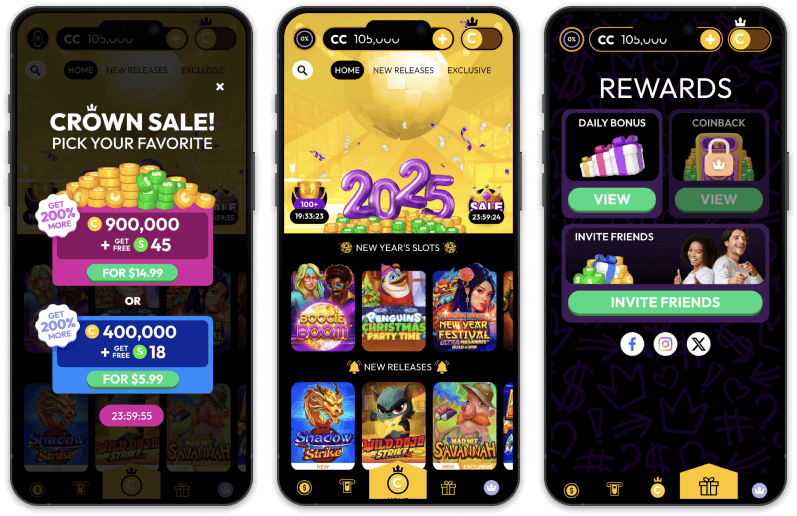
| 💼 Crown Coins owner | Sunflower Limited |
| 💰 Crown Coins welcome bonus | Get 200% More Coins on First Purchase - 1.2M CC + 60 SC + Spin to Win up to 200 SC |
| 🤑 Crown Coins sign-up bonus | 100,000 CC + 2 FREE SC |
| 💸 First-purchase bonus | Get 200% More Coins on First Purchase - 1.2M CC + 60 SC + Spin to Win up to 200 SC |
| 🔐 Daily login bonus | Progressive up to 100K CC + 0.5 SC on day 7 |
| 📫 Mail-in offer | 1 SC |
| 🗣️ Referral program | Up to 400,000 CC + 20 FREE SC per referral |
| 👑 VIP program | Crown VIP Club |
| 🕹️ Games | Slots, Live Casino, HiLo, Roulette, Coin Flip, Plinko |
| 🎲 Crown Coins Arcade | Plinko+, Spaceman, Tower Rush Crown Coins, Magic Dice |
| 🆕 New Releases | Crown Coins Super Lion, Mummy's Jewels, Clover Strike Hold & Win, Lucky Rainbow Rush, Diamond Hits Trip Instastrike |
| 💎 Crown's Exclusive | Cupid Spree, Coins of Olympus, Golden Penny, Mummy Riches, Crown Sports Red & White Club |
| ⚠️ Prize redemption coin minimums | 50 SC for bank transfer, gift card, or Skrill |
| 📱 App availability | iOS |
| ⛔️ Restricted states | CA, CT, ID, LA, MI, MT, NJ, NV, NY, WA |
| 🔗 Key links | Crown Coins Casino review | Crown Coins bonus code |
📝 Crown Coins player reviews
"I love playing on Crown Coins!! They always have new games to play, new tournaments, jackpots, all kinds of things you can be a part of. Not to mention great graphics, discounts, social media posts which include quizzes, questions, comments, new games, just a huge variety of things to do!! Lastly, payouts are great, redemption was easy and didn’t take too long to receive. Thanks Crown Coins!!!"
"CrownCoins Casino has been a very easy website to play on. It offers nice daily login bonuses as well as substantial weekly and monthly ones. When I had an issue cashing out my winnings their customer support resolved my issue within 24 hours. I've been playing on their site daily for about 6 months now and will continue to do so."
"Absolutely love Crown Coins Casino! The games are fun, exciting, and very smooth to play. There’s a great variety of slots and casino-style games, plus the bonuses and rewards keep it interesting. The app runs well without glitches, and I really enjoy the daily promotions. It feels fair, entertaining, and easy to use. Definitely one of the best casino-style apps out there. Highly recommend!"
2. LoneStar — Best social media giveaways
"LoneStar Casino is the sister site to the well-regarded RealPrize Casino. While its game library is smaller than Stake.us and McLuck, LoneStar is picking up the pace and adding games quickly. They have 16 new titles in their 'Fresh Releases' section. They have plenty of ongoing promotions, and their social media presence (Instagram & Facebook in particular) with drops and other free coins is impressive. The foundation is strong, and their association with RealPrize is a strong endorsement of things to come."
"LoneStar updated it's layout in November 2025 and that redesign has made things easier to navigate. Along with an expanded games library, more bonus offers listed on the site, and a dedicated mobile app.
 Colin MacKenzie, Senior Casino Editor
Colin MacKenzie, Senior Casino Editor
✅ Free daily bonus of 5,000 GC + 0.3 SC
✅ Video Poker and Texas Hold'Em games
✅ Coin bundles start at $2.99
✅ Sister site of popular sweepstakes casino
✅ Great collection of games providers
✅ Website redesign in November
❌ No sweepstakes app in app stores
❌ Limited live dealer titles
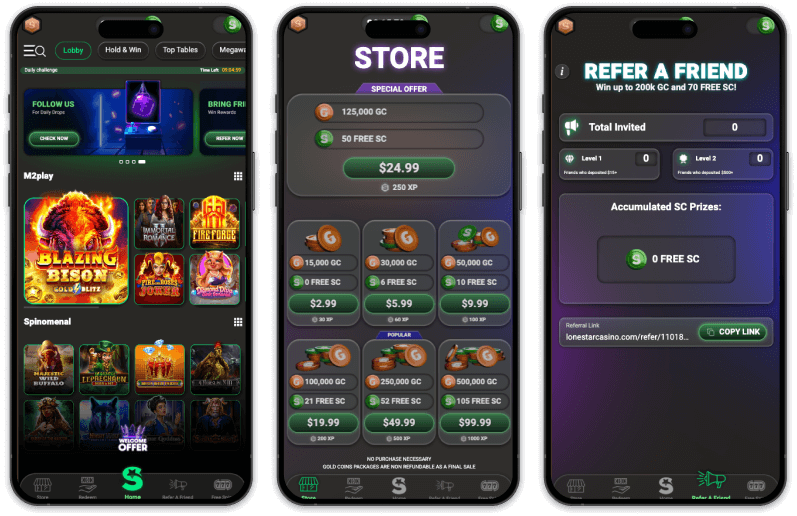
| 💼 LoneStar owner | RealPlay Tech Inc |
| 💰 LoneStar welcome bonus | 225,000 GC + 52.5 FREE SC + 250 VIP Points |
| 🤑 LoneStar sign-up bonus | 100,000 GC + 2.5 FREE SC |
| 💸 First-purchase bonus | 125,000 GC + 50 FREE SC + 250 VIP Points for $24.99 |
| 🔐 Daily login bonus | 5,000 GC + 0.30 FREE SC |
| 📫 Mail-in offer | 1 FREE SC |
| 🗣️ Referral program | Earn up to 200,000 GC + 70 FREE SC |
| 👑 VIP program | LoneStar Casino VIP |
| 🕹️ Games | Slots, Blackjack, Poker, Video Poker, Instant Win |
| 🎲 LoneStar Top Slots | Mutagenes, Fish Tales Halloween, 777 Ultra Coin Magnetic Bonus Buy, Take The Shot, Olympian Legends |
| 🆕 Fresh Releases | Lucy Luck and the Quest for Coins, Finnegan's Treasure 2, 3 Leprechaun Charms, Sugar Teddy x1000, The King of Social Media |
| 💎 High Rollers Favorites | Goal Blitz Shootout, Golden Reindeer, Emperor's Rise, Emberfall, Water Blox |
| ⚠️ Prize redemption coin minimums | 45 SC for gift cards or 100 SC for a bank transfer |
| 📱 App availability | PWA |
| ⛔️ Restricted states | CA, CT, DE, ID, LA, MD, MI, MT, NJ, NV, NY, RI, TN, WA, WV |
| 🔗 Key links | LoneStar Casino review | LoneStar Casino promo code |
📝 LoneStar player reviews
"Great sweeps casino. Gives lots of bonus sweeps coins on there social websites like FB insta discord Etc.. and also redemptions are reasonably quick as long as you have all your ducks in a row (kyc verifications) so given all I've said good luck for everyone who joins lonestar and have great time"
"I'm still learning the ins and outs of LoneStar, but they have frequent promos with free SC, an excellent selection of tames, and most of the package deals are very affordable and have a good return. Haven't won enough to redeem yet but I don't expect difficulty if I get that point. What I really appreciate is the large print and large icons as my vision is very impaired if there isn't enough light."
"Great games quick redemptions for sure my daily and top apps that I click into on the daily . Generous rewards . Follow their social media etc for more bonuses and SC they stay on top of their social media accounts and offer fun incentives and engage w us players very well."
"Lonestar is by far my favorite! They always have promos and free sc giveaways. They cash out to bank or gift cards. My redemption process was quick and the support help I received when I needed to send documents was able to answer my questions and provide me with accurate information kindly. "
3. RealPrize — Easiest daily login bonus to claim
"Launched in 2023, RealPrize offers 700+ free-to-play games, free SC coin bonuses, and a variety of purchasing options. New players are rewarded with 100,000 GC and 2 free SC just for joining. Additionally, you can claim our exclusive first-purchase bonus to add a massive 2 million GC, 80 free SC, and 1,000 VIP Points to your account for $25. One thing I really love about RealPrize is how easy it is to claim the daily bonus of 5,000 GC + 0.30 SC, which pops up on your screen when you login.
"RealPrize makes tournaments easy to play, as they are displayed front and center on the screen when you log in. Right above them is also a button for 'Daily Challenges.' One area where RealPrize shines is their referral program, where you can earn 70 Free SC. This is more lucrative than Crown Coins (20 Free SC) and matches their sister site LoneStar."
 Colin MacKenzie, Senior Casino Editor
Colin MacKenzie, Senior Casino Editor
✅ Sign-up offer up to 2,000,000 GC, 80 Free SC
✅ Fantastic daily free coin bonuses
✅ Up to 200K GC + 70 Free SC using referral link
✅ 700+ games from top software providers
✅ Seven-tier VIP program is great for players
✅ Coin packages available at just $3.00
❌ No sweepstakes app in app stores
❌ Live chat is tied to VIP program
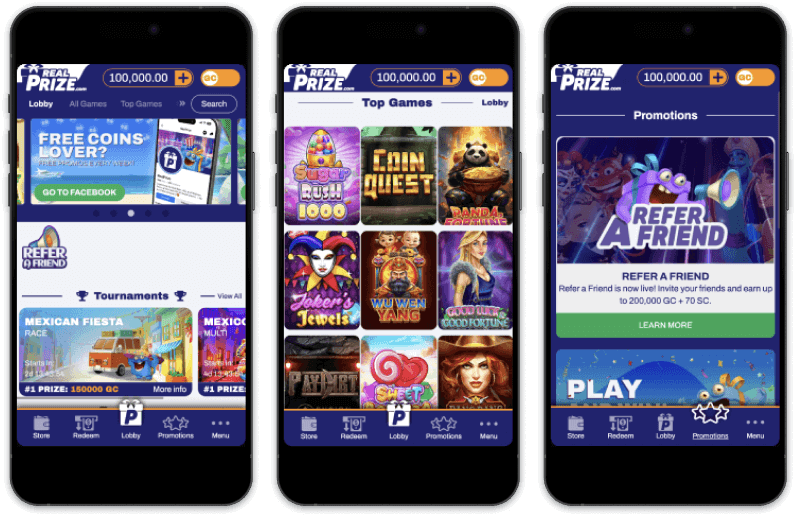
| 💼 RealPrize owner | RealPlay Tech Inc |
| 💰 RealPrize welcome bonus | 2.1 Million GC + 82 FREE SC + 1,000 VIP Points |
| 🤑 RealPrize sign-up bonus | 100,000 GC + 2 FREE SC |
| 💸 First-purchase bonus | Purchase 2 million GC for $25 and receive 80 SC and 1,000 VIP Points |
| 🔐 Daily login bonus | 5,000 GC and 0.30 FREE SC |
| 📫 Mail-in offer | 1 FREE SC |
| 🗣️ Referral program | 200,000 GC and 70 FREE SC if they purchase $15 in coins |
| 👑 VIP program | RealPrize Loyalty Cards |
| 🕹️ Games | Slots, Live Casino, Roulette, Blackjack, Live Game Shows, Dream Catcher, Video Poker, Sic Bo, Plinko |
| 🎲 Most Played This Week | Kong's Jungle Tower, Crash Chicken, Guardian of Glory, Wu Wen Yang, Hyper Strike Diamond Drums |
| 🆕 New Releases | Dig N Drop, Timeless Diamonds Hold and Win 3x3, Hot Rio Samba, Digging For Wilds, Medusa vs Perseus Stone Duel |
| 💎 RealPrize Picks | Gold Blitz Ultimate, Queen of Water, Mighty Mammoth, Drunken Sailors, Mystic Magic |
| ⚠️ Prize redemption coin minimums | 45 SC for gift cards or 100 SC for a bank transfer |
| 📱 App availability | iOS / PWA |
| ⛔️ Restricted states | CA, CT, DE, ID, LA, MD, MI, MT, NJ, NV, NY, RI, TN, WA, WV |
| 🔗 Key links | RealPrize Casino review | RealPrize promo code |
📝 RealPrize player reviews
"RealPrize is the best trust is they model they showed me the the upmost greatest TimePlay and SuperFast Redemption.Can’t wait to buy another package deal I just love their SC mode,NewApp,their just the 🐐 right now. RealPrize#1🏆🏆🏆 Happy 2 Anniversary"
"User friendly, great selection of games and the customer service is awesome. They also offer a good daily bonus with chances to earn even more by participation on their facebook page and more. Give them a try."
"Legit sight with a multitude of games, fun to play, and daily bonuses to keep you spinning. Real money, real prizes, real wins. Full of real potential. One downside is support is mainly email based so it can take a while to communicate but they are efficient and deal with any issues swiftly."
4. Stake.us — Best for original games
"Stake.us is the ideal sweepstakes casino platform for crypto enthusiasts seeking to play high-quality casino games for free. Boasting over 2,200+ casino games, surpassing competitors like RealPrize (700+ titles) and (Crown Coins 400+), there's something for everyone with slots, live dealer games, game shows, poker, burst games, table games, scratch cards, and a series of Stake Originals.
"Whenever I log in to Stake.us, I check the leaderboards and challenges to see what games are available. Another area Stake.us shines is the bonus drop codes, which are available via Stake.us's Instagram and X feeds. My main complaint about Stake.us is that it's a crypto-only platform, and I understand that this is a barrier for some players."
 Colin MacKenzie, Senior Casino Editor
Colin MacKenzie, Senior Casino Editor
✅ Sign-up bonus is larger than most
✅ Instant prize redemptions
✅ Daily bonus drop codes
✅ Highly rated iOS app
✅ Weekly drop codes, slot battles, daily races
✅ 75+ exclusive titles with RTPs up to 98%+
❌ Crypto only
❌ 3x playthrough requirement
❌ Full welcome bonus takes 30 days to claim
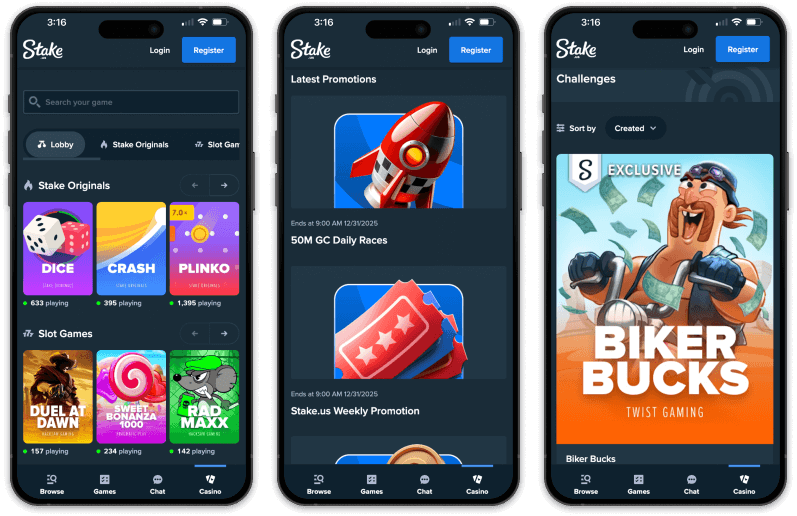
| 💼 Stake.us owner | Sweepsteaks Limited |
| 💰 Stake.us welcome bonus | Up to 550,000 GC, $55 Stake Cash + 3.5% Rakeback |
| 🤑 Stake.us sign-up bonus | 250,000 GC + $25 Stake Cash |
| 💸 First-purchase bonus | N/A |
| 🔐 Daily login bonus | 10,000 GC + 1 SC (for the first month) |
| 📫 Mail-in offer | $5 in Stake Cash |
| 🗣️ Referral program | 10% commission rate based on the house edge and gameplay |
| 👑 VIP program | Stake VIP Club |
| 🕹️ Games | Slots, Live Dealers, Table Games, Dice, Crash, Plinko, Mines, Pump, Darts, Snakes, Burst Games, Scratch Cards, Poker |
| 🎲 Popular titles | Le Fisherman, Dojo Duel, Dragonspire, Toon Pilot, Golden Geese |
| 🆕 New Releases | Superstar Sevens, Lion Stacks, Knight Fall, Yummy Mummies, Crystal Peak |
| 💎 Only on Stake | Dojo Duel, Dragonspire, Toon Pilot, Golden Geese, Phoenix 1000 |
| ⚠️ Prize redemption coin minimums | 30 SC for instant prize redemption |
| 📱 App availability | iOS |
| ⛔️ Restricted states | AZ, CA, CT, DE, ID, KY, LA, MD, MI, MT, NJ, NV, NY, PA, RI, VT, WA, WV |
| 🔗 Key links | Stake.us Casino review | Stake.us promo code | Stake.us referral code | Stake monthly bonus |
📝 Stake.us player reviews
"I’ve had a really solid experience on Stake.us. The site runs smoothly, games load fast, and there’s a great mix of slots and casino games to keep things interesting. I like that it feels fair and transparent, and the overall vibe is clean and easy to use, even on mobile. It’s been one of the more enjoyable platforms I’ve played on, and I’d definitely recommend it to anyone looking for a fun, reliable place to play online."
"Overall I’ve done well playing on Stake. I appreciate the instant payouts, bonus codes offered on social media, Saturday stream codes, and challenges. I have nothing bad to say about Stake, overall it’s been a great experience."
"Immediate real cash payout Great selection of games. Very prompt responses from live support 24 hours a day. Best VIP program I’ve ever experienced with daily, weekly, and monthly bonuses. Tailored bonuses as you move up. Immediate withdrawal/cash-out capabilities."
5. Mega Bonanza — Great collection of hourly, daily, and mega jackpots
"Mega Bonanza is part of the B-Two Operations network of sweepstakes casinos. That’s why I've been keeping tabs on them since their launch in mid-2024. Some of the things I enjoyed most while playing Mega Bonanza were the referral bonuses, regular tournaments, and lucrative hourly, daily, and mega jackpot offers.
Mega Bonanza is among my top choices for hardcore slots enthusiasts, jackpot hunters, and tournament players. There are over 1,200 titles from 40 industry-leading game providers, with new games added weekly. One area I'd like to see Mega expand into is table and live dealer titles."
 Colin MacKenzie, Senior Casino Editor
Colin MacKenzie, Senior Casino Editor
✅ Real money prize redemptions available at 75 SC
✅ 4 Free SC mail-in offer
✅ Referral bonus can reach up to 130,000 GC + 65 Free SC
✅ Hourly, Daily, and Mega jackpots available
✅ 24/7 live chat customer support
✅ Over 1,200 slots
❌ No table or live dealer titles
❌ Live chat requires a purchase to activate

| 💼 Mega Bonanza owner | B-Two Operations Limited |
| 💰 Mega Bonanza welcome bonus | 150% First Purchase Offer: Get Up to 600K GC + 303 Free SC |
| 🤑 Mega Bonanza sign-up bonus | 7,500 GC + 2.5 FREE SC |
| 💸 First-purchase bonus | 150% boost to get up to 600K GC + 303 Free SC |
| 🔐 Daily login bonus | 1,500 GC and 0.2 Free SC |
| 📫 Mail-in offer | 4 Free SC |
| 🗣️ Referral program | Up to 130,000 GC + 65 Free SC |
| 👑 VIP program | N/A |
| 🕹️ Games | Slots |
| 🎲 Popular Games | Viking Crusade, JMania Turkey Chef, Black Wolf 2, Aztec Fire Hold and Win, Pirate Chest Hold and Win |
| 🆕 New Releases | Flaming Chicken Highway Hazard, Striking Diamonds 2, Atomic Coins 3x3 Running Wins, Wild Stack Frenzy, Pub Fruits |
| 💎 Exclusive titles | DJ Tiger x1000, Poseidon's Trident Strike, Mad Hit Gold, 3 Eternal Drums, Catch The Robbers |
| ⚠️ Prize redemption coin minimums | 75 SC for bank transfers and 10 SC for gift cards |
| 📱 App availability | PWA |
| ⛔️ Restricted states | AL, CT, DE, ID, KY, LA, MD, MI, MT, NJ, NV, NY, TN, WA, WV |
| 🔗 Key links | Mega Bonanza Casino review | Mega Bonanza bonus code |
📝 Mega Bonanza player reviews
"This sweeps is awesome, im having trouble with something and I'll give 5* if unlocked so i can redeem, i have been trying to switch to a different email and i logged in and bought a package and played and won, took screenshot and everything. There games are like no other."
"More great experiences, there are no other casinos out there that will give hourly and daily bonuses like Megabonanza. NONE. Now last I did lose around $30 or so but I cant complain, you win some you lose some. There are no other casinos like i enjoy more than Megabonanza."
"Frequent Winning!!! 🏅 I really enjoy Mega Bonanza, even with few payout options, redemptions were in my bank within 48-72 hours!!!! I would love more rewards with them, but have nothing negative to say. Dependable, reliable, trustworthy."
6. McLuck — Best for Gold Coin and Sweeps Coins Jackpots
"McLuck is one of the titans of the sweepstakes casino market. I love the 5 free SC as part of the sign-up offer, which is far superior to much of its competition — RealPrize, LoneStar, Casino.Click all offer 2 free SC. The referral bonus can also net you up to 100 free SC. The games catalog is also elite with RubyPlay, 3 Oaks, Playson, Peter & Sons, and many more powering the library. I tend to venture to the McJackpots where 200 million Gold Coins and 100,000 free sweepstakes casinos are up for grabs.
"I would like to see table games added to McLuck. Still, to their credit, they've expanded their live casino section to include 11 versions of blackjack, six variations of roulette, as well as random titles like Crash Live and Gravity Plinko. Another perk is that McLuck has a great app available for iOS and Android users."
 Colin MacKenzie, Senior Casino Editor
Colin MacKenzie, Senior Casino Editor
✅ 5 Free SC as part of sign-up offer
✅ McJackpots are worth up to 200,000 GC +100,00 SC
✅ Sweepstakes app for iOS and Android players
✅ McLuck Loyalty Program
✅ Gift card redemption starts at 10 SC
✅ Over 3,300 titles
❌ Live chat requires purchase
❌ No RNG table games, video poker, fishing titles, or scratch cards
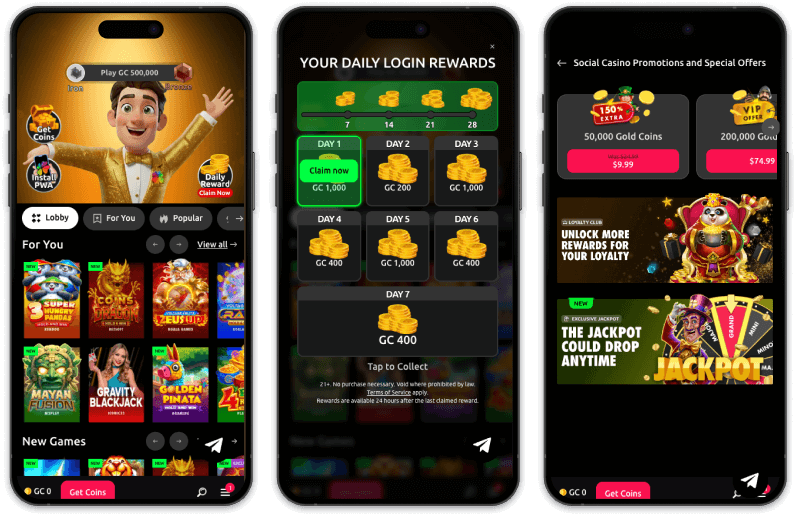
| 💼 McLuck owner | B-Two Operations Limited |
| 💰 McLuck welcome bonus | Receive up to 57,500 GC + 30 FREE SC |
| 🤑 McLuck sign-up bonus | 7,500 GC + 5 FREE SC |
| 💸 First-purchase bonus | Purchase 50,000 GC for $9.99 and receive 25 SC for free and access to exclusive GC games. |
| 🔐 Daily login bonus | 1,500 GC and 0.20 SC |
| 📫 Mail-in offer | 4 FREE SC |
| 🗣️ Referral program | Get up to 200,000 GC + 100 FREE SC |
| 👑 VIP program | McLuck Loyalty Club |
| 🕹️ Games | Slots, Live Casino, Blackjack, Roulette, Live Game Shows, Baccarat |
| 🎲 Popular titles | CoinUp Hot Fire 3x3, Hit More Gold Hold and Win, Aztec Fire Hold and Win, Black Wolf Hold and Win, Pirate Chest Hold and Win |
| 🆕 New Games | Panda Fortune Rush, 8's on Fire Supercharged, Gems of Ra, Fruit Blast, Fish Tales Colossal Catch |
| 💎 McLuck Exclusives | 3 Eternal Drums, Poseidon's Trident Strike, Catch The Robbers, Devil's Coins HotFire, Mad Hit Gold |
| ⚠️ Prize redemption coin minimums | 10 SC for a gift card or 75 SC for cash prizes |
| 📱 App availability | iOS & Android |
| ⛔️ Restricted states | CA, CT, DE, ID, KY, LA, MD, MI, MT, NJ, NV, NY, OH, WA, WV |
| 🔗 Key links | McLuck Casino review | McLuck promo code | McLuck referral code |
📝 McLuck player reviews
"I was hesitant to try McLuck, I normally use another site. Mostly because I was unsure about the cash out process, having read stories of long delays etc. Well I had a bit of luck and the cash out process was simple. Gift cards take about 24 hours and bank deposits 2-3 days (I did both). Based on that I would recommend McLuck."
"Can't ever say McLuck Casino disappoints me. I don't always win but the excitement that the games bring makes each experience an experience to remember!!!! I'll be back, again and again."
"Was able to cash out from a free spins promotion!!! Was a little nervous reading reviews of other peoples experience!! Cashed out on a Saturday got it Tuesday morning!!! So I was really impressed!! Thanks mcluck!!"
7. Spree — Best selection of sweepstakes slots
"Spree launched in 2024 and quickly became an elite sweepstakes casino for slot enthusiasts. The games library is filled with over 2,350 slot titles from 35 industry-leading game providers, including 3 Oaks, Playson, BGaming, M2Play, and many more. I have a soft spot for progressive jackpots and tend to head to SpreePotz for their SC jackpots. There is no shortage of bonuses and free coins for players, and tournaments are becoming a bigger and bigger part of the Spree casino experience. And I should point out that gift card prize redemptions start at just 10 SC, which is always a plus."
 Colin MacKenzie, Senior Casino Editor
Colin MacKenzie, Senior Casino Editor
✅ 2,350+ sweepstakes slots available
✅ Progressive jackpot network 'SpreePotz'
✅ Quick gift card redemptions available at just 10 SC
✅ Plenty of ongoing promotions
✅ Games lobby features great UX
✅ 4 Free SC mail-in bonus
❌ No app in iOS or Google Play Store
❌ No live chat support
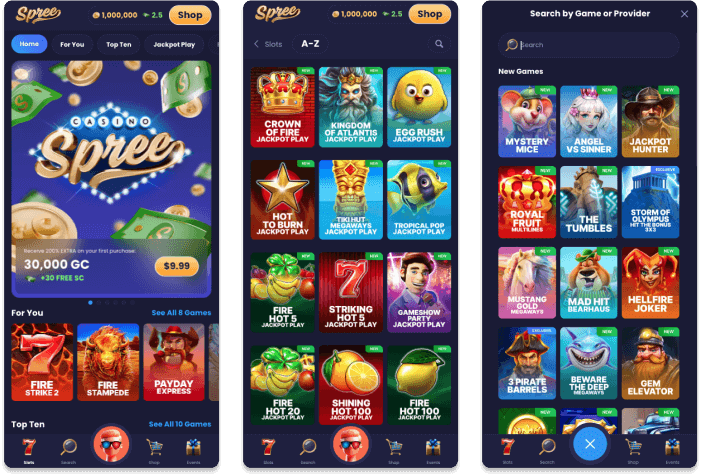
| 💼 Spree owner | Play Spree Ltd |
| 💰 Spree welcome bonus | Get up to 1,030,000 GC + 32.5 FREE SC |
| 🤑 Spree sign-up bonus | 1,000,000 GC + 2.5 FREE SC |
| 💸 First-purchase bonus | 30,000 GC+ 30 FREE SC for $9.99 |
| 🔐 Daily login bonus | 6,000 GC + 3.55 SC for free if you log in for three consecutive days |
| 📫 Mail-in offer | 4 Free SC |
| 🗣️ Referral program | Earn 10 SC for each friend's $15 spend |
| 👑 VIP program | XP Loyalty Program |
| 🕹️ Games | Slots, Live dealer tables |
| 🎲 Spree Popular Slots | Hot Triple Sevens Hold and Win, 4 Wolf Drums, Fortune Llama Hyper Heist, Snoop Dogg Dollars, Esqueleto Explosivo |
| 🆕 Brand New | Fruit Blast, Sugar Teddy, Piggy Bank Coins, Pub Fruits, Electro Blast 7s |
| 💎 Spree Signature | Catsino, Spree Inferno Coin Rise, Spree Gold, Diamond Spree Explosion, Spree Buffalo Extreme 10,000 |
| ⚠️ Prize redemption coin minimums | 10 SC for a gift card or 75 SC for cash prizes |
| 📱 App availability | N/A |
| ⛔️ Restricted states | CA, CT, DE, ID, KY, LA, MD, MI, MT, NJ, NV, NY, WA, WV |
| 🔗 Key links | Spree review | Spree Casino bonus code |
📝 Spree player reviews
"My experience with Spree has been the best. Nice game selection, great, timely and diligent Customer Support. Verification process was quick and smooth. Redemption process has been even faster. The money reached my account in less than 12 hours."
"Absolutely highly recommend Spree Casino! So many games there is definitely something for everyone! Plus there’s always a rewarding quest that’s always very rewarding! 5 starts for sure!"
"Spree is the first casino I've ever played online & its still in my top 3 to play! Games are fun, payouts (which I've gotten many of) are literally like 24 hours now! My experience with customer service is phenomenal! & My favorite part is the random free scratch off tickets! Thank you Spree! You have a loyal player forever!!"
8. Hello Millions — Best user experience
"No sweepstakes casino has the look and feel of Hello Millions with its bold, comic-style branding and colorful games lobby. I always feel a positive energy vibe from the site and find it very easy to navigate. The daily reward bonus is front and center, making it easy to activate the games library, which is filled with 35 of the most popular providers, including RubyPlay, 3 Oaks, Playson, Iconic21, and Peter & Sons, to name a few."
 Colin MacKenzie, Senior Casino Editor
Colin MacKenzie, Senior Casino Editor
✅ Great games catalog from 30 providers
✅ Progressive jackpots available
✅ 2.5 Free SC sign-up bonus is above average
✅ Plenty of ongoing promotions
✅ 20+ live dealer games
✅ Android and PWA app available
❌ No VIP program
❌ No RNG table games

| 💼 Hello Millions owner | B-Two Operations Limited |
| 💰 Hello Millions welcome bonus | Get up to 92,500 GC + 52.5 Free SC |
| 🤑 Hello Millions sign-up bonus | 7,500 GC + 2.5 Free SC |
| 💸 First-purchase bonus | Claim 50,000 GC for $9.99 and receive 25 SC for free — a 150% boost. |
| 🔐 Daily login bonus | 1,500 GC + 0.20 SC every 24 hrs |
| 📫 Mail-in offer | 4 FREE SC |
| 🗣️ Referral program | Up to 130K GC + 65 FREE SC per referral |
| 👑 VIP program | N/A |
| 🕹️ Games | Slots, Blackjack, Plinko, Roulette, Live Game Shows, Baccarat |
| 🎲 Popular titles | CoinUp Hot Fire, Hit More Gold, Black Wolf, Pirate Chest, Lion Gems |
| 🆕 New slots | Panda Fortune Rush, 8s On Fire Supercharged, Gems of Ra, Fruit Plast, Fish Tales Colossal Catch |
| 💎 Arcade Games | Gravity Plinko, Plinko Slam Dunk, Coinsweeper, Winter Fishing Club, Balloon Mania |
| ⚠️ Prize redemption coin minimums | 10 SC for gift cards and 75 SC for cash redemptions |
| 📱 App availability | Android |
| ⛔️ Restricted states | CA, CT, DE, ID, KY, LA, MD, MI, MT, NJ, NV, NY, OH, WA, WV |
| 🔗 Key links | Hello Millions review | Hello Millions promo code |
📝 Hello Millions player reviews
"Hellomillions has been an awesome sweepstakes casino experience. The platform is easy to use, the game variety keeps things interesting, and everything runs smoothly. The best part is the fast payouts when you win, which really shows they’re legit and player-friendly. Definitely a casino I feel comfortable recommending."
"I absolutely love the competition they have going on right now. It makes it so much more exciting. Also the daily login gets higher each day now — more so than most other online casinos. It makes me look forward to logging in to collect that. I haven't had my big win yet but it's coming I know!"
"Honestly, Hello Millions has been a great surprise. The daily bonuses are pretty sweet, and it’s nice to have something extra every day. I also like their social media competitions—they’re fun and a cool way to win some extra perks. The promotions they run keep things interesting, so it never feels stale. The site’s easy to navigate, the games are solid, and cashing out has been smooth so far. I’m definitely sticking around!"
"I love HelloMillions. They have a variety of casino games. Tons of slots. Always up to date on newest slots. They're customer service is always friendly and helpful. Very Consistent. You always know what your gonna get here. No surprise account deactivations. They have giveaways everyday on all social media platforms. Im just really happy what HelloMillions is about."
9. Fortune Coins — Best collection of ongoing promotions
"Fortune Coins' promo page is my favourite spot for bonuses. They always have seasonal offers and a bunch of ongoing bonus programs, including a 'Mystery Box' awarded to players based on their recent gameplay. All the standard promotions are here Fortune Coins sign-up bonus, mail-in offer, login bonus, and 'Fortune Star of the Month' VIP program."
 Colin MacKenzie, Senior Casino Editor
Colin MacKenzie, Senior Casino Editor
✅ Slew of ongoing seasonal promotions
✅ Over 1,500 slot titles
✅ Android app available in Google Play Store
✅ Tournament zone powered by Realistic
✅ Frequent promos released on social media
✅ Dedicated Plinko section
❌ No table or live dealer titles
❌ Live chat, but there is a detailed FAQ section

| 💼 Fortune Coins owner | Blazesoft Ltd. |
| 💰 Fortune Coins welcome bonus | Up to 1.23 Million GC + 3,900 FREE FC |
| 🤑 Fortune Coins sign-up bonus | Up to 1.23 Million GC + 3,900 FREE FC |
| 💸 First-purchase bonus | 5,000,000 GC + 2,000 FC for $10 or 5,197,400 GC + 2,598 FC for $19.99 or 3,998,000 GC + 1,999 FC for $7.99 |
| 🔐 Daily login bonus | Day 1: 150,000 GC and 50 FC; Day 2: 200,000 GC and 50 FC; Day 3: 720,000 GC and 120 FC |
| 📫 Mail-in offer | 500 Free FC |
| 🗣️ Referral program | Earn up to 120M GC + 4,500 FC per friend |
| 👑 VIP program | Fortune Star of the Month |
| 🕹️ Games | Slots, Plinko, Instant Win, Jackpots |
| 🎲 Hot games | 3 Gates of Pyramid, Mad Hit Ho Ho Hot Pudding, MexoMax 2, Zeus Power Hold and Win, Coins Win 2 Hold The Spin |
| 🆕 New titles | Tea Party of Fortune, 7 Superstar Sevens, Triple Fire Pots Hold & Win, Happily Ever After Once Upon A Multiplier, Royal Piggy Hold The Spin |
| 🎣 Fishing slots | Emily's Treasure, Le Fisherman, Wild Whopper, Fins of Fortune, The Great Fishing Adventure Hold and Win |
| ⚠️ Prize redemption coin minimums | 5,000 FC |
| 📱 App availability | Android, PWA |
| ⛔️ Restricted states | CA, CT, DE, ID, LA, MI, MT, NJ, NV, NY, WA |
| 🔗 Key links | Fortune Coins review | Fortune Coins bonus code |
📝 Fortune Coins player reviews
"Fortune Coins has been absolutely amazing! Their redemption process is fast, smooth, and hassle-free. I was honestly impressed with how quickly everything was processed and paid out. The games are fun, the site is easy to use, and their redemptions are some of the fastest I’ve experienced."
"The verification process was a bit too intense, but honestly, they've been very responsive and DID let me cash out. They also honor mistakes that were made, which they weren't obligated to do and overall have been great!"
"Top notch support, helped me with the problems I was having verifying my account, once that was done the redemption only took 48 hours or so to hit my account. Support contact is only by email but they respond very quickly. Play with confidence, have fun My second biggest win on a single spin was on this site."
10. Funrize — Great collection of scratch cards
"What draws me to Funrize is the scratch mania section and the unique slots available. The site is very user-friendly, with games organized into sections such as Popular, Jackpot, Asia, Retro Reels, VIP Games, Bonus Mania, and more.
"One thing I've always noticed with Funrize is they don't necessarily work with the biggest game developers, but they partner with a lot of the smaller providers, which does create a distinctive selection of slots. I haven't played many games from Mancala or Popiplay, but it's nice to see that Funrize is providing a platform for new game providers."
 Colin MacKenzie, Senior Casino Editor
Colin MacKenzie, Senior Casino Editor
✅ Great collection of scratch games
✅ Wide variety of slots from unique providers
✅ Scratch Mania gives players a chance to win more coins
✅ Funrize Races are available daily
✅ Coin bundles start at $4.99 and lots of promotional bundles
✅ Live customer support available for all players
❌ No live or table games available
❌ Social media accounts appear to be inactive
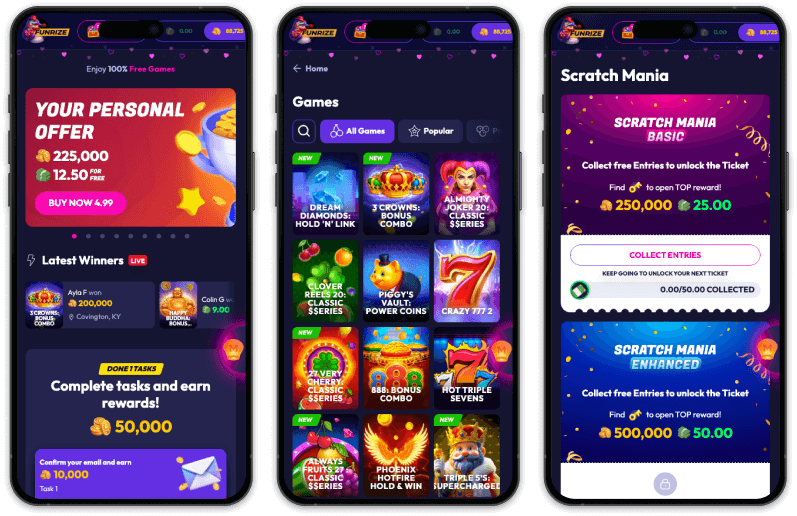
| 💰 Funrize welcome bonus | Receive up to 2,125,000 TC + 10,000 FREE PE |
| 🤑 Funrize no-deposit bonus | 125,000 TC |
| 💸 First-purchase bonus | Purchase 2,000,000 TC and 10,000 PE for $49.99. |
| 🔐 Daily login bonus | 0.20 PE |
| 📫 Mail-in offer | 1 FREE PE |
| 🗣️ Referral program | Varies, up to 220,000 TC and 400 PE on the 'Funrize Wheel |
| 👑 VIP program | Funrize Club |
| 🕹️ Games | Slots, Jackpots, Scratch |
| 🎲 Popular titles | Big Catch Bonanza, Fortune Fish Frenzy, Hot Cash Hold 'N' Link, 7777: Bonus Combo, Amazing Diamonds: Hold 'N' Link |
| 🆕 New titles | Tidal Gold, Tiki Thunder, Piggy Bank Coins, The Big Race: Hold 'N' Link, Once Again Upon A Time, Whispers Of NYX |
| 🔥 Hot Slots | Dancing Lanterns 2, Almighty Diamonds, Red Planet, 3 Lucky Lion, Power of Robin Hood |
| ⚠️ Prize redemption coin minimums | 25 PE for a gift card or 100 PE for cash |
| ⛔️ Restricted states | CA, CT, DE, ID, LA, MI, MT, NJ, NV, NY, RI, WA, WV, WY |
| 🔗 Key links | Funrize Casino review | Funrize promo code |
📝 Funrize player reviews
"FunRize has been one of the most consistent Sweeps Casinos. Extremely fast payout, support responds within two minutes, without fail, no matter the time of day. They have deals every week, always a good % extra too, sometimes REALLY good. The deals, game selection, payout speed, and support, keeps me coming back here every weekend when I have time to play."
"I do so enjoy this gaming platform. I wish they’d alllow for crypto options but I find that it doesn’t take long for general push-to-card payout. I haven’t tried PayPal payout yet though. The only issue I face is with customer service most the time and I feel like it’s just AI run rampant posing as a real person or someone who’s never talked to an actual human being in their 54 years they’ve already spent on this planet"
"I have played lots of sweepstakes platforms for a long time now and this is the first time I have left a review. I can honestly say if you're going to play, this is the one — I just pray nothing changes here. If it stays the way it is, or gets even better, this is the one! Did I mention Funrize has the fastest payout I have ever seen from one, and I have cashed out on a few. My first redemption, it was less than 12 hrs [before the prize was] in my account."
"Funrize is a great experience as long as you read the terms! If you want to win and redeem all your prize, you need to make sure your balance is at zero. Otherwise you'll only be able to redeem 25 of it, because you had promotion or bonus money on there. The redemption was quick though. It was less than four hours on a weekday!"
🔍 My favorite sweeps casino this month
"My favorite sweeps casino this month is RealPrize. I keep coming back because the GC packages are affordable, and I regularly grab the $6.99 deal to top off my balance. I like the Hot Machine feature, which highlights newer slots and makes it easy to jump into titles like Night Wolf Frozen Flames and Mighty Mammoth without digging through the lobby. I’ve also enjoyed the rotating tournaments and challenges, which give me extra chances to test new games and pick up bonus rewards along the way."
List of sweepstakes casino expert guides in 2026
We've spent over 1,000 hours playing sweepstakes casinos, testing redemption times, game variety, KYC process, mobile app, UX, responsible social gaming tools, live chat, and other criteria we think are important to provide players with an educated, impartial, unbiased breakdown.
| 🎰 Sweepstakes casino | 💡 Guides | 🎯 Best features |
|---|---|---|
 |
Crown Coins Casino bonus | Crown Coins review |
Best overall sweepstakes casino and top rated iOS casino app. |
 |
RealPrize bonus code | RealPrize review | Easy to claim daily login bonus. |
 |
LoneStar promo code | LoneStar review | Great new sweepstakes casino adding new titles weekly. |
 |
Stake.us promo code | Stake.us review | Best for bonus drop codes on social media. |
 |
ACE.com promo code | ACE.com review | 2.5 Free SC as part of the sign-up bonus. |
 |
Jackpota promo code | Jackpota review | 45+ game providers and low SC minimum redemptions for gift cards. |
 |
McLuck promo code | McLuck review | Best sweepstakes casino app for both iOS and Android users. |
 |
Hello Millions promo code | Hello Millions review | Fun user-friendly design and coin bundles start at just $1.99. |
 |
Sixty6 promo code | Sixty6 review | Over 900 slots from 18 top software providers, eight-tier VIP program. |
 |
NoLimitCoins bonus code | NoLimitCoins review | They offer a great collection of daily tournaments, Fishing titles, and jackpot slots. |
 |
Spree Casino promo | Spree review |
Over 2,300 titles from 35+ providers and gift card redemptions start at just $10. |
 |
Funrize promo code | Funrize review | Nine ongoing promotions and the Funrize Club is a top VIP program. |
 |
Legendz Casino bonus | Legendz review | Legendz also has a live casino and social sportsbook. |
 |
SweepNext promo code | SweepNext review | Daily mystery login bonus and frequent tournaments. |
 |
SpeedSweeps promo code | SpeedSweeps review | Speciality games and a choice of first-purchase bonuses. |
 |
Fortune Coins Casino bonus | Fortune Coins review | Daily Fortune Coins Casino FC challenges available on social media. |
 |
Spinfinite Casino bonus | Spinfinite review | Daily Missions and there are several first-purchase bonus options. |
 |
Baba Casino promo code | Baba Casino review | Large no-deposit bonus and progressive daily login rewards. |
 |
BCGAME.us promo code | BCGAME.us review | 9,000 slots and casino-style games from 60+ games providers. |
 |
BettySweeps promo code | BettySweeps review | Great sign-up bonus of 3,000 BC + 3 Free SC and 24/7 live chat. |
 |
BetRivers.net bonus code | BetRivers.net review | The social casino for BetRivers offering thousands of free games. |
 |
Big Pirate promo code | New sweepstakes casino filled with island adventure games and daily challenges. |
 |
Bracco Casino promo code | Hybrid sportsbook and casino with generous mail-in rewards. |
 |
Casino Click promo code | Casino Click review | Great banking options accepting FIAT and cryptocurrency. |
 |
Cazino promo code | Cazino review | Easy customer support access, but ongoing promotions could be improved. |
 |
Chanced Casino bonus code | Chanced review | Exclusive Chanced Originals titles, live casino with 25 titles. |
 |
Ding Ding Ding Casino bonus | Ding Ding Ding review | Community chat rooms, great collection of fishing games, and telephone support. |
 |
FreeSpin promo code | FreeSpin review | More than 100 exclusive games, accepts crypto purchases, and free live support. |
|
|
A daily 'Prize Wheel' is available every 12 hours, awarding guaranteed free coins. | |
 |
FunzCity Casino promo code | FunzCity review | Slots and Fishing titles and daily missions to win free coins. |
 |
Gains promo code | Gains review | Selection of first-purchase offers and a large daily login bonus. |
 |
Gambino Slots bonus code | Gambino Slots review | True social casino that's been popular since it opened in 2015. |
|
|
Started as a bingo site and has added slots and was a charity sweeps casino for a time. | |
 |
Gold Treasure Casino bonus | Gold Treasure review | User-friendly site with a great sign-up bonus and prize redemptions start at 50 SC. |
 |
High 5 Casino promo code | High 5 review | Great responsible gaming program for U.S. players. |
 |
JackpotRabbit promo code | JackpotRabbit review |
5% daily playback and themed slots collections. |
 |
Jumbo88 promo code | Jumbo88 review |
Over 1,600 games and multiple first-purchase and reload bonuses. |
 |
LuckyBird.io promo code | LuckyBird.io review | Crypto sweeps casino with daily unlimited faucet. |
 |
Mega Bonanza Casino bonus | Mega Bonanza review | Prize drops, tournaments, leaderboards, and daily competitions. |
 |
Modo.us Casino bonus | Modo.us review | Progressive daily rewards program and a wide variety of unique casino games. |
 |
Moonspin Casino promo code | Moonspin review | Crypto sweepstakes casino with a great three-day Free SC welcome bonus package. |
 |
PlayFame promo code | PlayFame review | Prize redemptions start at 10 SC, sign-up offer includes 3 SC. |
 |
Pulsz promo code | Pulsz review | Fantastic casino app available on iOS and Android. |
 |
Pulsz Bingo promo code | Pulsz Bingo review | Best sweepstakes casino for bingo enthusiasts. |
 |
Punt.com promo code | Punt.com review | Hourly free SC rewards and free live chat support for all players. |
 |
Rich Sweeps promo code | Rich Sweeps review | More than 4,000 slots and a daily spin for regular prizes. |
 |
Rolla promo code | Rolla review | Player-2-Player chat and more than 1,600 games. |
 |
Sheesh Casino promo code | Sheesh Casino review | Variety of niche games, plus Happy Hour and Flash Deal promotions. |
 |
Sidepot.us promo code | Sidepot.us review | Over 1,300 titles with coin bundles available for just $0.99. |
 |
Smiles Casino bonus | Five Free SC coins for all new players and bundles start at just $1.99. |
 |
Spin Blitz bonus | Spin Blitz review | Great reputation and an impressive selection of scratch-offs and jackpot play titles. |
 |
SplashCoins promo code | SplashCoins review | Seven first-purchase bonuses, and free live chat benefits rookie players. |
 |
StormRush promo code | StormRush review | 'Energy Pack' discounts on first seven coin bundles and three separate daily rewards. |
 |
SweepShark promo code | Sweepshark review | 5% daily payback and progressive SC login bonuses. |
 |
Sweet Sweeps promo code | Sweet Sweeps review | 'Sweet Spin Wheel' among fun ongoing promotions, but 2x playthrough requirements on SC. |
 |
Tao Fortune bonus | Tao Fortune review | Great collection of slots and 9 fishing games and coin bundles starting at $4.99. |
 |
The Money Factory promo code | The Money Factory review | 2,200+ titles, tournaments, and live dealer games from Iconic21. |
 |
Zula Casino bonus | Best sweepstakes casino sign-up bonus with 10 Free SC for new players. |
List of sweepstakes casinos in February 2026
| 🎰 Sweeps operator | 💰 Sweepstakes Casino sign up bonus |
|---|---|
| 1. 𝐀 A1 Casino | 20,000 GC + 20 SC for $10 first purchase bonus |
| 2. 🂡 Ace.com | 90,000 GC + 2.5 Free SC Sign-Up Bonus |
| 3. 🌰 Acorn Fun | 77,777 Gold Coins + 0.3 Free Sweeps Coins |
| 4. 🇺🇸 American Luck | 60,000 Gold Coins + 6 Free Sweeps Coins |
| 5. ⛏ Baba Casino | 500,000 GC + 2 Free SC |
| 6. 🍌 Banana Bets | 10,000 Gold Coins |
| 7. 💣 BangCoins | 50,000 Gold Coins + 1 Free Sweeps Coin |
| 8. 🏦 BankRolla | 200,000 Gold Coins + 2 Free Sweeps Coins |
| 9. 🌐 BCGAME.us | 60 Free Spins + 360% Coin Boost |
| 10. 🃏 Betcoin.Social | 2,000 Gold Coins + 2 PBR Sweeps Coins |
| 11. 🌊 BetRivers.net | Up to $1,000 in VC |
| 12. 👩 Betty Sweeps | 13,000 BC + 13 FREE SC |
| 13. 🐟 Big Fish Casino | 100,000 Chips |
| 14. 🏴☠️ Big Pirate | Up to 2,010,000 Gold Coins + 202 Free Diamonds + 10 Rum Coins |
| 15. 🐶 Big Shot Games | 10,000 Gold Coins + 2 Free Sweeps Coins |
| 16. 🚢 Bingoport | 500 Port Points + 2 Free Access Tokens |
| 17. 🎲 BitBetWin | $20 first bet offer Sign-Up Bonus |
| 18. ₿ Bitsky.bet | 10,000 Gold Coins + 1 Free Sweeps Cash |
| 19. 👾 Bitsler.io | 37,500 Gold Coins |
| 20. ☢️ BoomWins | Up to 19,000 Game Tokens + 19 Free Sweep Tokens |
| 21. 💝 BootyChaser | 100% Match on first donation up to $500 |
| 22. 🟤 Bracco | 10,000 Coins + 5 Bracco Cash |
| 23. ✈️ BucksJet | 8,000 Gold Coins + 3 Free Sweep Coins |
| 24.🃏 Card Crush | 5 Cards + 2 Mystery Boxes |
| 25. 🎪 Carnival Citi | 10,000,000 Coins + 5,000 Sweeps Coins |
| 26. 💼 Cases.GG | 3 Free Cases on sign-up |
| 27. 💶 Cashoomo | 4,000 Gold Coins |
| 28. 🖱️ Casino Click | 300,000 GC + 22 FREE SC with First-Purchase Bonus |
| 29. 🥋 CasinoKai | 1,000 Gold Coins + 2.5 Free Sweeps Cash |
| 30. 𝐂 Cazino | 8,500 Lucky Coins + 4.5 Free Sweeps Coins |
| 31. ﹖ Chanced | Up to 210 FREE SC + 2.1M GC First-Purchase Bonus |
| 32. 🧀 Cheddr | 5,000 Cheddr Coins |
| 33. 🐿️ Chip'n WIN | 15,000 Gold Coins + 15 Crystals |
| 34. 🕺 Chumba Casino | 2M Gold Coins + 2 Free Sweeps Coins |
| 35. 🍎 Cider | 20,000 Gold Coins + 0.30 Free Sweeps Coins |
| 36. 🏙 CityVerse Tycoon | Get 1,000 Gold Coins + 5 Free Sweep Coins |
| 37. ♧ Club Casino | 100% welcome offer 200k Gold Coins + 40 Free SC |
| 38. 🪩 ClubGG | 20% Store Discount after Subscription |
| 39. ♣️ Clubs Poker | Claim up to 25,000 Gold Coins + 5 Free Sweeps Coins |
| 40. ⛃ ClubWPT | 5,000 Play Chips + 500 Tournament Points |
| 41. 🐔 Cluck.us | 100,000K Gold Coins + 5 Free Cluck Bucks |
| 42. 🏦 CoinBucks | 8,000 Gold Coins + 4.5 Free SC |
| 43. 🏰 CoinsRoyale | 300,000 Fun Coins + 3 Free Sweeps Coins |
| 44. 😎 Cool Spin | 81,000 Gold Coins + 4.5 Sweeps Coins |
| 45. 💰 Coinz.us | 50,000 Gold Coins |
| 46. 🌠 Cosmo Slots | 10,000 Game Tokens + 5 Sweeps Tokens |
| 47. 🤺 CrashDuel | 1,000 Gold Coins +1 Free Sweeps Coins |
| 48. 🏁 CrazyWin | Coming Soon |
| 49. 👑 Crown Coins | Get 200% More Coins on First Purchase - 1.2M CC + 60 SC + Spin to Win up to 200 SC |
| 50. 🤭 Dara Casino | 100,000 Gold Coins + 2 Free Sweeps Coins |
| 51. 👺 Daruma.us | 20,000 Gold Coins + 1 Free Sweeps Coin |
| 52. 🌌 DexyPlay | Up to 1.65M Gold Coins + 88 Free Super Coins + 65 Free Plays |
| 53. 🛎️ DingDingDing | 2,600,000 GC + 35 Free SC |
| 54. 🔟 DimeSweeps | 50,000 Gold Coins + 1 Free Sweeps Coins |
| 55. 🕶 Dogg House | 1,000 Dogg Coins + 1 Dogg Cash |
| 56. 💵 Dollar Mills | 8,000 Gold Coins + 3 Free Sweeps Coins |
| 57. 🧚🏻♀ Enchanted | 5 BTC + 180 Free Spins |
| 58. 🦅 Epic Sweep | 100,000 Gold Coins + 2 Free Sweeps Coins |
| 59. 🔥 Fire Kirin | Free Daily Wheel Spin |
| 60. 7️⃣ Fire Sevens | 250,000 Gold Coins + 1 Free Super Coins |
| 61. ☁️ Fliff | 5,000 Fliff Coins + 1 Fliff Cash |
| 62. 🥠 Fortune Coins | Up to 1.23 Million GC + 3,900 FREE FC |
| 63. 🛞 Fortune Wheelz | 500,000 GC + 1,125 FREE FC |
| 64. 🆓 FreeSpin | 200,000 Gold Coins + 20 Free SC Spins |
| 65. 🐠 Funrize | 2,125,000 TC + 10,000 FREE PE |
| 66. 🎊 Funz | 5 Gold Coins + 0.5 Sweeps Coin |
| 67. 🌴 FunzCity | 875,000 FC + 3,500 FREE CC |
| 68. 🥳 Funzpoints | 1,000 Standard Funzpoints + 250 Premium Funzpoints |
| 69. 🏋🏻♂️ Gains | 100,000 Gold Coins + 5 Sweeps Coins |
| 70. 🎡 Gambino Slots | 500,000 G-Coins + 200 Free Spins |
| 71. 🗄 Game Vault | $20 first bet offer Credits |
| 72. 🏟️ GameDayZone | Get 200% Extra |
| 73. 🧈 Gold Ahoy | 20,000 Gold Coins + 2 Free Sweeps Coins |
| 74. 💛 Golden Hearts Games | 250,000 GC + 2.5 FREE SC |
| 75. 🤞Gold N Luck | 400,000 Gold Coins + 1 Free Sweeps Coin |
| 76. ⚙️ Gold Machine | 100,000 Gold Coins + Free 1 Sweeps Coins |
| 77. 🌕 Gold Rush City | 15,000 Gold Coins + 500 Sweeps Coins |
| 78. 🔱 GoldSlips | 10,000 Fun Coins + 5 Gold Slips |
| 79. 🗝️ Gold Treasure Casino | 600,000 GC + 29 FREE SC |
| 80. ⛏ Go Go Gold | 100,000 Gold Coins + up to 8 Free Sweeps Coins |
| 81. 😀 Good Vibes | 100,000 Gold Coins + Special Gift |
| 82. 🔐 Grand Vault Casino | 50,000 Gold Coins + 25 FREE Sweeps Coins |
| 83. 🍬 Gummy Play Casino | 100,000 Gold Coins + 3 Free Sweeps Coins |
| 84. 📱 HappyEnding | 2,000 Fun Coins + 5 Free Sweeps Coins |
| 85. 🎸 Hard Rock Jackpot Casino | 300,000 Free Coins |
| 86. 🏝️ Havana Fortuna | 50,000 Gold Coins + 3 Free Sweeps Coins |
| 87. 💥 Hello Millions | 92,500 GC + 52.5 Free SC |
| 88. ✋ High 5 | 1,020 GC + 108 FREE SC + 1,300 Diamonds |
| 89. 🐎 Horseplay | First purchase bonus up to $500 |
| 90. 🤫 Hush Casino | 1,000,000 Gold Coins |
| 91. 🫂 Huuuge | 5,000,000 chip Welcome Bonus |
| 92. ⓘ iCasino | 100,000 IC Coins + 2 Free Sweeps Coins |
| 93. 💲 Jackpota | 87,500 GC + 42.5 Free SC + 75 Free Spins |
| 94. ⏩ Jackpot Go | 10,000 Gold Coins + 1 Free Sweeps Coin |
| 95. 🐰 Jackpot Rabbit | 125,000 Gold Coins |
| 96. 💃 JefeBet | 100,000 Gold Coins + 2 Free Sweeps Coins |
| 97. 🫦 JuicyPopSlots | 100,000 Gold Coins + 3 Free Sweeps Coins |
| 98. 8️⃣8️⃣ Jumbo88 | 10,000 Gold Coins and 1 Free Sweepstakes Coin |
| 99. 🥾 Kickr | 150,000 Bits Sign-up Bonus + 4 Free Bucks |
| 100. 🏰 KingPrize | 10,000 Gold Coins + 1.5 Free Sweeps Coins |
| 101 ☘️ Lavish Luck | 20,000 Gold Coins + 0.3 Sweeps Coins |
| 102. 🌚 Legendz | 100% Bonus on First Purchase! Up to 203 FREE SC + 20,500 GC |
| 103 🦁 Lions Den | 1 Lions Den Coin |
| 104. ▶ Live Play Mobile | 10,000 Coins + 50 Credits + 1,000,000 Slot Bucks |
| 105. 🤠 LoneStar | 225,000 GC + 52.5 FREE SC + 250 VIP Points |
| 106. 🫅 Loyal Royal | 2,000 Loyal Coins + 2.5 Royal Rubies |
| 107. 🌆 Lucky Bits Vegas | Coming Soon |
| 108. 🐥 LuckyBird.io | 5,000 GC, 0.98 SC + 3 Treasure Chests |
| 109. 🛶 Lucky Canoe | 2,000 Gold Coins + 1.2 Free Sweeps Coins |
| 110. 🐡 Lucky Goldfish | No bonus listed on site |
| 111. 👐 Lucky Hands | 1,000,000 Gold Coins + 2 Free Sweepstakes Coins |
| 112. 🧧 Lucky Jackpot Hit | 2,000,000 Welcome Coins |
| 113. 🙋 Lucky Me | 20,000 Gold Coins + 2 Free Sweepstakes Coins |
| 114. Ω LuckyOne.us | 20,000 Gold Coins + 2 Free Sweeps Coins |
| 115. 🎉 Lucky Party | Claim up to 200,000 Gold Coins + 20 Free Sweeps Coins |
| 116. 🥩 Lucky Stake | 50,000 Gold Coins + 25 Free Sweeps Coins |
| 117. ✨✨ Lucky Stars | 100,000 Gold Coins + 3 FreeSweeps Coins |
| 118. 🎢 LuckyLand Casino | 777,777 Gold Coins + 2 Free Sweeps Coins |
| 119. 🍀 Luckyland Slots | 7,777 Gold Coins + 10 Free Sweeps Coins |
| 120. ᯓ LuckyRush.io | 10,000 Gold Coins + 0.20 Sweeps Coins |
| 121. 🔖 Luckyslots.us | Up to 3,800,000 Gold Coins + 38 Free SC |
| 122. 🚂 LuckXpress | 50,000 Gold Coins + 3 Free Sweeps Coins |
| 123. 🦊 LuckyZino | 12,000,000 Gold Coins + 1.7 Free Sweeps Coins |
| 124. 🌗 Lunar Luck | 60,000 Gold Coins + 3 Free Sweepstakes Coins |
| 125. 🎡 Lunaland | 50,000 Luna Coins + 1 Free Sweeps Coin |
| 126. 🗺 MaxQuest | 50,000 QuestCoins + 5 MaxCoins |
| 127. 🍔 McLuck | 57,500 GC + 30 FREE SC |
| 128. 📣 Mega Bonanza | 150% First Purchase Offer: Get Up to 600K GC + 303 Free SC |
| 129. 📢 Mega Frenzy | 20,000 Gold Coins + Free Spins |
| 130. 💫 MegaSpinz | Get 60,000 Gold Coins + 40 Free Sweeps Coins + Mega Wheel Spin! |
| 131. 🍾 MetaWin | Win $100K in daily prizes |
| 132. 🆚 Me v U | Coming Soon |
| 133. 🌡️ Midas Jackpot | 1,000 Gold Coins + 0.25 Free SC |
| 134. 🌌 Milky Star Slots | 3,777 Gold Coins + Sweepstar Coins |
| 135. 🤖 Modo.us | 37,500 GC + 550 VIP Points + 6 FREE SC |
| 136. 🐵 MonkeySpins | 100,000 Gold Coins + 2.5 Free Sweepstakes Coins |
| 137. 🪙 Moonspin | 60,000 GC + 3 FREE SC |
| 138. 🐮 Moozi | 20,000 Gold Coins + 1 Free Sweeps Coins |
| 139. 👨🏻 Mr. Goodwin | 160,000 Gold Coins + 2 Free Sweeps Coins |
| 140. 🚨 MyJackpot.com | 150,000 Free Chips |
| 141. 🎊 MyPrize.us | 1,000 Gold Coins + 1 Sweeps Cash |
| 142. 📀 Nio Play | 100,000 Gold Coins + 3 Free Sweeps Coins |
| 143. 🟡 NoLimitCoins | 1.36 Million GC + 6,100 FREE SC |
| 144. 🧃 Novig | 1,000 Novig Coins + 5 Novig Cash |
| 145. 🏹 Orion Strike | Coming Soon |
| 146. ☯ Panda Master | First bet offer Credits |
| 147. ⛰️ PeakPlay | BOGO offer on coin packages |
| 148. 🖊️ Penn Play | Integrated with of PENN Play Rewards |
| 149. 👇 PICKEM | 50,000 Gold Coins + 1 Free Sweeps Coins |
| 150. 🛝 PlayFame | 90,000 GC + 33 FREE SC |
| 151. 🕹️ Playnomic | 2,000 Tokens and 0.10 Sweeps Coins |
| 152. ♠️ PlaySoPo | 1,000 Gold Coins |
| 153. 🎭 Playtana | 175,000 Gold Coins + 1 Free Sweeps Coins |
| 154. 🧞♂️ Pulsz | 1,005,000 GC + 77.3 Free SC + 750 Pulsz points + a Golden Key |
| 155. 🎱 Pulsz Bingo | 90,000 GC + 9.8 FREE SC |
| 156. 🏈 Punt.com | Up to 152 FREE SC + 1,510,000 GC |
| 157.📍QuestPlay | 100,000 Gold Coins + 1 Free Sweeps Coin |
| 158. 🎞️ RadPoker | 2,000 Gold Coins + 1.2 Free Sweeps Coins |
| 159. 🌈 Rainbow's End | 7,500 Gold Coins + 0.50 Sweeps Coins |
| 160. 𐂐 Rake.us | Coming Soon |
| 161. 🎁 RealPrize | 2.1 Million GC + 82 FREE SC + 1,000 VIP Points |
| 162. 🤑 Rich Sweeps | 50,000 Gold Coins + 1 Free Sweeps Coin |
| 163. 🏞️ River Sweeps | $10 first bet offer Credits |
| 164. 🍥 Rolla | 3 Million GC + 32 FREE SC |
| 165. 💲Rolling Riches | 100,000 Gold Coins and 1 Sweeps Coin |
| 166. 💂♂️ Roll Royale | 1,000 Gold Coins + 5 Free Sweeps Coins |
| 167. 👩 Roxy Moxy | 50,000 Gold Coins + 2.5 Free Sweeps Coins |
| 168. 🔻 Ruby Sweeps | 10,000 Gold Coins |
| 169. 🏃 Runestake | Various rakebacks, giveaways, live rains, Sweeps Cash and Fun Cash based on participation in chats |
| 170. 👟 Runewager | 50,000 Fun Cash + 5 Sweeps Cash |
| 171. 🗡 Rust Clash | 50,000 Coins + 1 Free Case |
| 172.⛱️ Scarlet Sands | 250,000 Gold Coins + 1 Free Sweeps Coin |
| 173. ᝰ.ᐟ Scratchee | Discount Hub for exclusive savings |
| 174. ␥ Scratchful | 7,500 Gold Coins and 2.5 Sweepstakes Coins |
| 175. 🐱 Scratchstakes | Up to 80 free scratch card plays per day |
|
176. 🍨 Scoop |
10,000 Gold Coins + 1 Free Sweeps Coins |
| 177. 🎩 Scrooge | 250 Sweeps Tokens and 2M Gold Coins |
| 178. 😒 Sheesh | 50,000 Gold Coins + 5 Free Sweeps Coins |
| 179. 🔀 Shuffle.us | 25,000 Gold Coins + 1 Free Shuffle Cash |
| 180. 🫖 Sidepot.us | Up to 90,000 GC + 41 FREE SC |
| 181. 6️⃣6️⃣ Sixty6 | 100,000 Gold Coins + 2 Free Sweeps Coins |
| 182. 🥏 Skills & Slots | No current sign-up bonus offer |
| 183. 🤹🏻 Skillz.com | Free Z Coins on signup |
| 184. 🍒 Slotomania | 1,000,000 Free Spins |
| 185. 😊 Smiles | 1 Million GC + 5 FREE SC |
| 186. 🧝🏽♂️ Sorcery Reels | 10,000 Gold Coins + 0.40 Free Sweeps Coins + 5 free spins |
| 187. 🏍 SpeedSweeps | 50,000 GC + 1 FREE SC |
| 188. 🔄 Spin Blitz | 57,500 GC, 12.5 FREE SC + 30 FREE SC Spins |
| 189. 🌪️ Spinfinite | 63,000 GC + 40 FREE SC + Mystery Bonus |
| 190. 👷 Spinova.us | 15,000 Gold Coins + 3 Free Sweeps Coins |
| 191. 👬 SpinPals | 30,000 Gold Coins + 3 Sweeps Coins |
| 192. 📜 SpinQuest | 10,000 Gold Coins + 1 Free Sweep Coin |
| 193. ⚔️ SpinSaga | 100 Gold Coins + 1 Free Saga Coins |
| 194. 🗽 Spins America | 100,000 Gold Coins + 2 Sweeps Coins |
| 195. 🧙♂️ Spin Sorcery | 10,000 Gold Coins + 0.4 Sweeps Coins |
| 196. 🐦 Spindoo | 11,111 Gold Coins + 2 Free Sweeps Coins + 3 Free Spins |
| 197. 🌊 Splash Coins | 150,000 GC + 2 Free Sweeps Coins |
| 198. ⚽ Sports Millions | 7,500 Gold Coins and 2.5 Sweeps Coins |
| 199. 🏆 Sportzino | 1.570.000 Gold Coins + 45 Free Sweeps Coins |
| 200. 💎 Spree | 1,030,000 GC + 32.5 FREE SC |
| 201. 🧱 Stackr | 500,000 GC + 25 Free Spins + 200% First Purchase Offer |
| 202. 🔵 Stake.us | Up to 550,000 GC, $55 Stake Cash + 3.5% Rakeback |
| 203. ⛈️ StormRush | 750,000 Gold Coins + 1 Free Sweeps Coins |
| 204. 🍭 Sugar Sweeps | $10 + 100% match |
| 205. 🦹🏻♀️ SweepBetz | 10,000 Gold Coins + 0.50 Free Sweeps Coins |
| 206. 🎮 SweepsCoins Games | 2 for 1 First Purchase Bonus |
| 207.🥤 Sweepico | 125,000 + 2 Free Sweeps Coins |
| 208. 🐒 Sweep Jungle | 75,000 Gold Coins + 2 Free Sweeps Coins |
| 209. 🏜️ Sweep Las Vegas | 1,000 Gold Coins + 2 Free Sweeps Coins |
| 210. 💨 SweepLuxe | 150% Now + 25% Daily for Free |
| 211. ⏭️ SweepNext | 25,000 Gold Coins + 2.5 Free Sweeps Coins |
| 212. 🦈 SweepShark | 175,000 Game Coins + 3 Free Sweeps Coins |
| 213. 🦾 Sweepstake.ai | 2,000,000 Gold Coins + 1 Free Sweeps Coins |
| 214. 🤴🏻 SweepsRoyal | 50,000 Gold Coins + 1 Free Sweeps Coin |
| 215.🍬 Sweet Sweeps | Get 7,500 Gold Coins + 2.5 Free Sweepstakes Coins |
| 216. 👨🏼⚖️ SweepsUSA | 5,000 Gold Coins + 5 Free Sweeps Coins |
| 217. 🤴 Sweeps.us | Get 5,000 Gold Coins + 3 Free Sweeps Coins |
| 218. 🧹 Sweeptastic | Get 30,000 LC + 30 Free Sweeps Coins |
| 219. 🎯 Sweepslots | 10,000 GC + 1,000 SC |
| 220. 📌 SweepSpot | 10,000 Gold Coins + 2 Free Sweeps Coins |
| 221. ✖ SweepX | Coming Soon |
| 222. 🖲 Sweepz | 100 Free Sweepz Coins |
| 223. ⛩️ Tao Fortune | 250,000 TC |
| 224. 🚬 TheBoss.Casino | 50,000 Gold Coins + 2.9 Boss Bucks |
| 225. 🏭 The Money Factory | 55,000 GC + 43 FREE SC |
| 226. 🌴 Threelz | 3,000 Gold Coins + 3 Free Sweeps Coins |
| 227. ⚡ Thrillzz | Get $3 of SC + 3,000 Coins |
| 228. 𝐓 ToraTora | 4,000 Gold Coins + 1 Free Sweeps Coins |
| 229. 🔺 Triller Sweeps | 15,000 Gold Coins + 3 Free Sweeps Coins |
| 230. 🐌 TurboStakes | 7,500 Gold Coins + 2 Free Sweeps Coins |
| 231. 🏗️ Tycoon | Coming Soon |
| 232. 🧿 UltraSpin | 200,000 Gold Coins + 2.5 Sweep Stars |
| 233. 🔔 VegasBonanza | 125,000 Gold Coins + 2.5 Free Sweeps Coins |
| 234. 🍸 Vegas Coins | 5,000 Gold Coins + 1 Free Sweeps Coin |
| 235. ♦️ Vegas Gems | Up to 1,000 Gems + 50% Extra Gems with First Purchase |
| 236. 🧨 VegasGlory | 25,000 Gold Coins + 1 Free Sweeps Coin |
| 237. 🛣 VegasWay | 350,000 Gold Coins + 1 Free Sweeps Coin |
| 238. ✌ Vivaro.us | 20,000 Gold Coins + 2 Free Sweeps Coins |
| 239. 🏯 Wandando | 5,000 Gold Coins + 10 Sweeps Coins Free Spins |
| 240. 🐴 Wildhorse Bucks | 5,000 Bucks + 5 Sweeps Coins |
| 241. 🌎 Wild World | 10,000 Gold Coins + 3 Sweepstakes Coins |
| 242. 🍷 Winera | 75,000 Gold Coins + 0.20 Free Sweeps Coins |
| 243. 🐼 WinPanda | 60,000 Gold Coins + 2 Free Sweeps Coins |
| 244. 🚧 Win Zone | 20,000 Gold Coins + 2.5 Free Sweeps Coins |
| 245. 🤩 WOW Vegas | 250,000 WOW Coins + 4 Free Sweeps Coins |
| 246. 🙌 Yay Casino | 50,000 Gold Coins + 5 Sweeps Coins |
| 247. 🗣 Yotta | Linked to first coin purchase |
| 248. 📺 ZitoBox | Up to $10 in Free Coins |
| 249. 🔊 Zoot | 20,000 Gold Coins + 2 Sweeps Coins |
| 250. ✨ Zula | 220,000 GC + 15 FREE SC |
| 251. 👽 Zunado | 10,000 Gold Coins + 10 Free Sweeps Coins |
What are sweepstakes casinos?
Sweepstakes are a free online gaming platform that allow players to enjoy casino-style games. You can play slots, blackjack, roulette, baccarat, plinko, bingo and many of the other games you would expect to see at online gaming sites.
When it comes to identifying a sweepstakes casino, look for these primary differences from their real money counterparts:
✅ Virtual currency: Sweepstakes casino sites use virtual currencies called Gold Coins and Sweeps Coins — the latter can also be referred to as Sweepstakes Coins.
✅ Free-to-play model: Players don't deposit money or place real money wagers — they use virtual currency.
✅ Prize redemption: Because gameplay doesn't use real money, players win SC and redeem them for rewards, usually gift cards or bank transfers.
✅ Legal accessibility: Sweepstakes casinos are legal in 40+ states.
"Whether you are looking for slots, table games, or live casino options, sweepstakes casinos offer everything you are used to seeing at igaming sites and more. A new sensation at online sweeps sites is 'fish' games. These skill-based, arcade-style shooting games are becoming increasingly widespread. Look for titles like Fish Catch, Crab King, and Golden Dragon."
 Colin MacKenzie, Senior Casino Editor
Colin MacKenzie, Senior Casino Editor
Is sweepstakes casino legit?
All the sweepstakes casinos we list on Covers are legit. Sweeps casinos are legal in most U.S. states. However, some states possess restrictive legislation that discourages brands from operating in them.
Sweepstakes casino sites operate outside traditional federal laws — in particular, the Unlawful Internet Gambling Enforcement Act of 2006 (UIGEA) — due to their unique free-to-play and virtual currency business model. This distinction allows them to operate legally in the majority of U.S. states.
Remember the following when looking to play at a Sweeps Coins casino:
✅ Sweepstakes casinos are legal across the country and only banned in California, Connecticut, Delaware, Idaho, Michigan, Montana, New Jersey, New York, and Washington.
✅ You can always play slots and all other casino games for free.
✅ Sweeps are compelled to offer an Alternate Method of Entry (AMOE) that does not require any purchase. Generally, this comes in the form of a mail-in bonus.
✅ No purchase is necessary to win nor do they increase your chances of winning.
Are sweepstakes casino going away?
Several states have passed legislation or taken regulatory actions to ban sweepstakes casinos, with a growing number of others actively considering similar measures. These jurisdictions are focusing on the dual-currency model that powers sweepstakes casinos, which critics see as a way to bypass regulations.
What is the legal age to play at sweepstakes casinos?
Most sweepstakes allow players to sign up from 18 years old and above, but some states have a higher minimum age requirement. For example, Alabama and Nebraska state laws set the age at 19+, and Mississippi plates must be over 21.
Over the past few months, we've seen many sweepstakes casinos raise their legal age to 21 across the country, regardless of state law. For instance, Hello Millions, Jackpota, McLuck, Mega Bonanza, PlayFame, Pulsz, SpinBlitz, and Stake.us.
Which states allow sweepstakes casinos?
California, Connecticut, Delaware, Idaho, Michigan, Montana, New Jersey, New York, and Washington are the only states where sweepstakes casinos are legally banned, while other states are also progressing anti-sweepstakes legislation.
| 📍 State | ⚖️ Are Sweepstakes Casinos Legal? |
|---|---|
| Alabama | ✅ |
| Alaska | ✅ |
| Arizona | ✅ |
| Arkansas | ✅ |
| California | ❌ Restricted by State Law ❌ |
| Colorado | ✅ |
| Connecticut | ❌ Restricted by State Law ❌ |
| Delaware | ❌ Restricted by State Law ❌ |
| Florida | ✅ |
| Georgia | ✅ |
| Hawaii | ✅ |
| Idaho | ❌ Restricted by State Law ❌ |
| Illinois | 🚨 Illinois Gaming Board and the AG’s Office send cease-and-desist letters to over 60 entities 🚨 |
| Indiana | 🚨Indiana lawmakers banning sweepstakes casinos, with bipartisan support and enactment before March 14th 🚨 |
| Iowa | ✅ |
| Kansas | ✅ |
| Kentucky | 🚨Legal, but many sweepstakes casinos are leaving the state🚨 |
| Louisiana | 🚨Louisiana Attorney General has declared sweepstakes casinos illegal🚨 |
| Maine | 🚨Maine proposes fines and a full ban on sweepstakes platforms in new legislation🚨 |
| Maryland | 🚨Maryland lawmakers targeting sweepstakes casinos with legislation🚨 |
| Massachusetts | ✅ |
| Michigan | ❌ Restricted by State Law ❌ |
| Minnesota | 🚨Minnesota AG announced the distribution of a letter demanding sweeps casinos cease operation in the state. 🚨 |
| Mississippi | 🚨VGW closing sweepstakes casinos in Mississippi🚨 |
| Missouri | ✅ |
| Montana | ❌ Restricted by State Law ❌ |
| Nebraska | ✅ |
| Nevada | 🚨Nevada Senate approved SB 256 one step closer to criminalizing sweepstakes casinos🚨 |
| New Hampshire | ✅ |
| New Jersey | ❌ Restricted by State Law ❌ |
| New Mexico | ✅ |
| New York | ❌ Restricted by State Law ❌ |
| North Carolina | ✅ |
| North Dakota | ✅ |
| Ohio | ✅ |
| Oklahoma | ✅ |
| Oregon | ✅ |
| Pennsylvania | ✅ |
| Rhode Island | ✅ |
| South Carolina | ✅ |
| South Dakota | ✅ |
| Tennessee | 🚨 Tennessee lawmakers unanimously advanced a bill to ban dual-currency online sweepstakes casinos 🚨 |
| Texas | ✅ |
| Utah | ✅ |
| Vermont | ✅ |
| Virginia | ✅ |
| Washington | ❌ Restricted by State Law ❌ |
| West Virginia | 🚨West Virginia crackdown leads to 20+ sweepstakes casinos exiting the state🚨 |
| Wisconsin | ✅ |
| Wyoming | ✅ |
"Just because sweepstakes casinos are legal in a state doesn't mean all sweepstakes casinos are available. Each sweepstakes casino operator chooses which states it operates in."
 Colin MacKenzie, Senior Casino Editor
Colin MacKenzie, Senior Casino Editor
🔍 What do you predict for the future of sweepstakes casinos?
"The sweepstakes casino industry is in a strong position because players want access to slots, live dealers, and table games in states where real-money casinos aren’t available. As long as operators stay transparent, compliant, and player-focused, demand will continue to grow, and players will keep coming back."

How do sweepstakes casinos work?
Sweepstakes casinos are free-to-play sites that operate on a dual-currency model, where Gold Coins are used for entertainment play and Sweeps Coins are used for any prize redemptions. When you win with Sweeps Coins, those winnings become eligible for prize redemption when requirements are met.
Most sweepstakes casinos require players to verify their identity, meet a minimum SC threshold, and complete play-through requirements before prizes can be redeemed. Before playing, it’s good practice to review a site’s KYC requirements and redemption rules—particularly minimum withdrawal limits, processing timelines, and accepted payout methods—to avoid surprises when it’s time to convert Sweeps Coins into cash or gift cards.
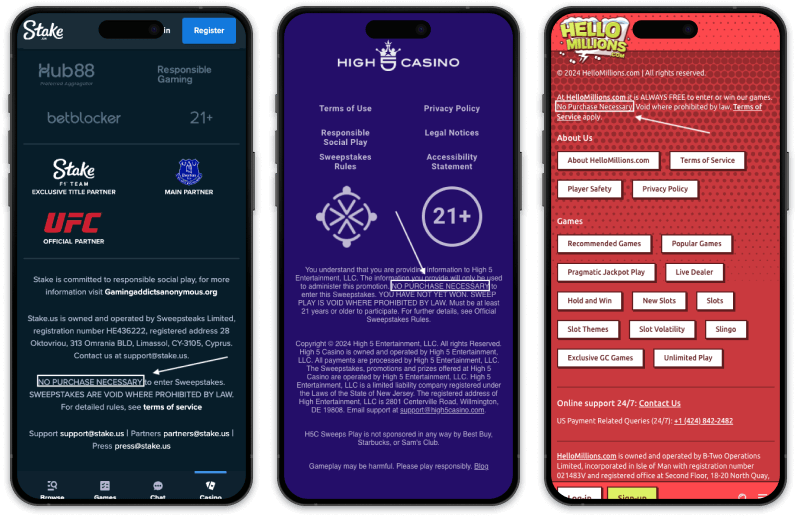
Because no money is ever required to play, sweeps casinos aren’t subject to the same regulations and licensing requirements as traditional real-money online casinos. Two key notes to look for are the use of a dual-virtual system, such as Gold Coins and Sweeps Coins, and the term 'No Purchase Necessary.' You can generally find the latter term capitalized, located in the bottom footer of any sweepstakes casino page.
How to win at sweepstakes casinos
We’ve put together our top tips to help give you the best chance to win at sweepstakes casinos:
-
Follow social channels
Player communities often sprout up on social media platforms. Sweeps casinos typically engage with followers on Twitter, Facebook, and YouTube. Chanced, for instance, does daily YouTube live-stream videos with an active chat group. Participating in these groups and social media contests is a great way to improve your gameplay skills, get support from fellow players, and receive free coins and bonus drop codes.
-
Read the rules for sweepstakes casino games carefully
Reading the terms and conditions is obvious but always worth bringing up. Every site has slight differences, whether it's minimum sweeps coins needed for redemptions, KYC requests, or what prizes are available for redemptions. Before playing, make sure you are familiar with the terms, and don't hesitate to reach out to customer support via live chat or social media channels if you have questions.
-
Take advantage of free Sweeps Coins
Sweepstakes casinos consistently award free SC, whether it's daily login bonuses or bonus drop codes. You can also ask live chat for them or mail-in a request, so there is no shortage of ways to get free coins and build up your account balance.
-
Choose respected game providers
Any game provider worth their salt has their games and their Random Number Generators (RNGs) tested and certified by independent bodies like Gaming Laboratories International (GLI), BMM Testlabs, and Gaming Associates. This ensures fairness and randomness. Some of our favorite providers include Playson, Novomatic, 3 Oaks Gaming, and Hacksaw Gaming.
Hacksaw Gaming, as an example, holds licenses from several reputable international regulatory bodies, including the Malta Gaming Authority (MGA), the UK Gambling Commission (UKGC), and the Isle of Man (GSC).
-
Understand RTP
Return to Player, commonly referred to as RTP, is vital to understanding sweepstakes casino games. RTP conveys the ratio of wagered coins that a game will pay back to players over time. For example, a sweepstakes slot with an RTP of 97% implies that, on average, players can expect to receive 97% of their wagered coins back over an extended gaming timeline. The remaining 3% represents the house edge or yield for the sweeps casino.
-
Sign up at multiple online sweepstake casinos
Every sweeps coin casino extends a sign-up bonus for new players, among other daily bonuses you can claim. There's no reason for you to not take advantage of these offers by signing up for multiple sweep sites.
-
Play games that require element of skill
Slots are easy to play and only require a tap of a button. Other games at online sweepstakes casinos, such as blackjack and poker, require skill that can significantly reduce the house edge. Luck will always be part of the game, but skill-based games can increase your chances of winning.
New sweepstakes casino sites
The list of new sweepstakes casinos available for U.S. players is continuously growing, with new casinos surfacing almost weekly. We always like to have a closer look at some of the new sweeps cash casino operators entering the market and select the top new additions.
Sweepico - January 2026
Sweepico is the first new addition to the online sweepstakes casino market I've seen in 2026. For a new site, the user experience is fantastic, the site is engaging, and very easy to navigate. There are a slew of bonuses, including daily login bonus, coinback, VIP, to name a few, and an incredible selection of discounted coin bundles. The games library is solid with over 1,000 titles.
✅ 1,000+ titles from over 10 game providers
✅ Great collection of discounted coin packages
✅ Daily Playback of 5% on purchased coins
✅ Wide variety of jackpot slots available
❌ No e-wallets
❌ No mobile app available - yet
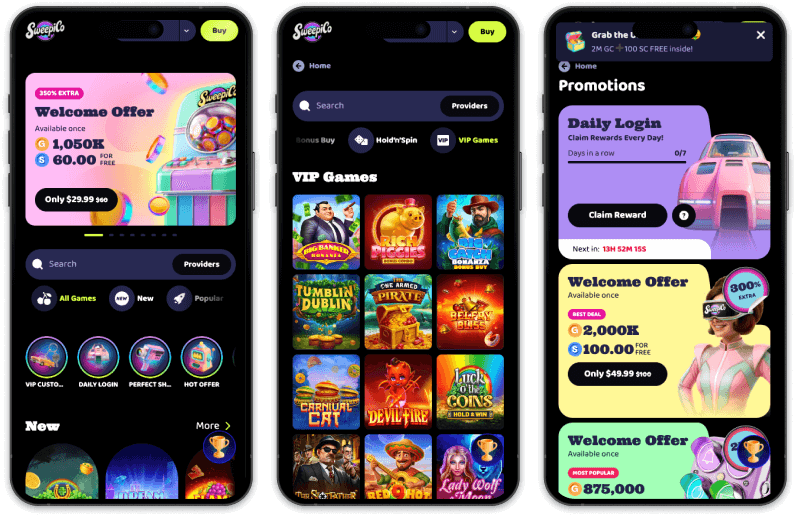
| 💰 Sweepsico welcome bonus | Up to 2,125,000 GC + 102 SC for $49.99 |
| 🤑 Sweepsico no-deposit bonus | 125,000 GC + 2 Free SC |
| 💸 First-purchase bonus | 450,000 GC + 10 SC for $2.99 1,050,000 GC + 60 SC for $29.99 2,000,000 GC + 100 SC for $49.99 |
| 🎲 Popular games | Genie's Chest: Hold 'N' Link, Dolphin Queen Hold 'N' Link, Jack Raider and The Lost Relics, Fortune Skulls, Snoop Dogg Dollars |
| ⚠️ Prize redemption coin minimums | 100 SC for bank transfers and 25 SC for gift cards |
| ⛔️ Restricted states | CA, CT, DE, ID, LA, MI, MT, NJ, NV, NY, RI, TN, WA, WV, WY |
SweepJungle - November 2025
SweepJungle went live in November 2025 and is the sister site of Sixty6 Casino. The games library is impressive, with a slots library of over 1,500 titles from industry leaders like BGaming, 3 Oaks, Booming Games, and many more. Another draw is the various bonuses, including two daily bonuses and a third virtual currency, 'Gems', for collecting Free Spins and other perks.
✅ 1,500+ slot titles from over 20 game providers
✅ Multiple Gold Coin sign up bonuses
✅ Fantastic UX
✅ 10-tier loyalty program
❌ No sweepstakes app yet
❌ Live chat isn't available 24/7

| 💰 SweepJungle welcome bonus | Up to 735K GC + 68 SC for $29.99 |
| 🤑 SweepJungle no-deposit bonus | 75,000 GC + 2 Free SC |
| 💸 First-purchase bonus | 220K GC + 22 SC for $9.99 440K GC + 44 SC for $19.99 660K GC + 66 SC for $29.99 |
| 🎲 Popular games | Crown Strike Hold and Win 3x5x3, Lava Coins 2 Hold and Win 3x5x3, Sweet Spotz, Royal Coins Hold and Win, Bonanza Billion |
| ⚠️ Prize redemption coin minimums | 100 SC |
| ⛔️ Restricted states | AZ, CA, CT, DE, ID, KY, LA, MD, MI, MS, MT, NV, NJ, NY, WA, WV |
KingPrize - October 2025
KingPrize is one of the newest sweepstakes casinos, debuting with 3,000 games from 30+ well-respected game providers. It’s also completely stocked with offers, including daily bonuses, a rewards scheme, a refer-a-friend bonus, and AMOE options, which is great to see in such a fresh entry to the sweepstakes market.
✅ 3,000+ titles from over 30 software providers
✅ Crash, Plinko, Wheels, Mines, Dice, Poker, Card sections
✅ Multiple first purchase bonus offers
✅ Majestic Fortune Wheel Bonus for daily prizes
❌ Limited customer support options
❌ Can only redeem once every 48 hours
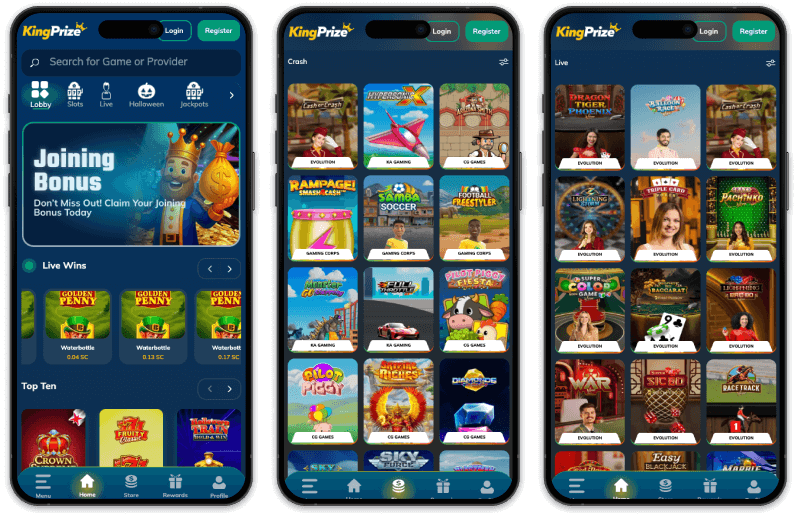
| 💰 KingPrize welcome bonus | 210k GC + 31.5 Free SC |
| 🤑 KingPrize sign-up bonus | 10,000 Gold Coins + 1.5 Free SC |
| 💸 First-purchase bonus | 200k GC + 30 free SC for $19.99 1M GC + 100 free SC for $69.99 2.5M GC + 250 free SC for $199.99 |
| 🎲 Popular games | 40 Treasures, Hot 7's x2, Columbus Treasure, Lucky Clover, ZombieLand |
| ⚠️ Prize redemption coin minimums | 75 SC |
| ⛔️ Restricted states | CT, DE, ID, LA, MI, MT, NV, NJ, NY, WA |
Rich Sweeps - August 2025
Rich Sweeps is one of the newest sweepstakes casinos in the U.S. market, and it’s already showing a lot of promise. New players are greeted with a sign-up bonus of 50,000 GC + 1 FREE SC. From there, players have access to over 4,000 titles. If you're looking for free coins, there is an exclusive Telegram channel for players.
✅ 4,000+ titles from over 30 software providers
✅ Multiple first-purchase bonus offers
✅ Referral bonus is a lifetime weekly commission
✅ Fiat and cryptocurrency purchase options
❌No social media giveaways
❌Minimum purchases start at $5.99, which is higher then competitors

| 💰 Rich Sweeps welcome bonus | Get up to 100,000 GC + 66 FREE SC |
| 🤑 Rich Sweeps sign-up bonus | 50,000 GC + 1 FREE SC |
| 💸 First-purchase bonus | 200% boost - 10,000 GC + 30 free SC for $9.99 100% boost - 25,000 GC + 50 free SC for $24.99 25% boost - 50,000 GC + 65 free SC for $49.99 |
| 🎲 Best games | Pilot, Plinko, Mines, Dice, Hi-Lo, Boxes, Coins |
| ⚠️ Prize redemption coin minimums | 100 SC for a bank transfer |
| ⛔️ Restricted states | ID, LA, MI, MT, NV |
🔍 Which new sweepstakes casino do you enjoy most?
"I’ve already spent time on Rich Sweeps, and it’s quickly become one of my favorite new sweepstakes casinos. The site has a massive game library with over 4,000 titles, and I’ve built my balance there, including reaching 250 SC from playing Coin Lamp by Three Oaks Gaming. The variety makes it easy to find something new without the experience feeling repetitive.
"I’m also watching Sweepico, which launched in January 2026. I haven’t fully explored it yet, but I’m curious to see how the brand approaches promotions and whether it becomes a strong option for earning and redeeming Sweeps Coins."

List of new sweepstakes casinos
With the surge in popularity, new sweeps casinos are launching every month, and our experts are always on top of the latest developments. Here is a list of new sweeps casinos in 2026 that we have our eyes on:
| New sweepstakes casinos | Best features | Opened |
|---|---|---|
| 🏁 CrazyWin | Coming Soon | TBD |
| 🌆 Lucky Bits Vegas | Coming Soon | TBD |
| 🆚 Me v U | Coming Soon | TBD |
| 🏹 Orion Strike | Coming Soon | TBD |
| 𐂐 Rake.us | Coming Soon | TBD |
| ✖ SweepX | Coming Soon | TBD |
| 🎩 Tycoon | Coming Soon | TBD |
| 🐌 TurboStakes | iOS and Android app and VIP coinback program | February 2026 |
| 💣 BangCoins | Over 3,500 titles and 8 ongoing promotional offers | February 2026 |
| 🧈 Gold Ahoy | Fun underwater theme with a great 0.5 Free SC daily bonus | February 2026 |
| Ω LuckyOne.us | 20+ game providers and multiple progressive jackpots | February 2026 |
| 🔔 VegasBonanza | 150% boost on first purchase and great daily login bonus | January 2026 |
| 🍷 Winera | 2,700+ titles and accepts crypto for coin purchases and prize redemptions | January 2026 |
| 🦹🏻♀️ SweepBetz | Texas based sweeps with 800+ slots and game show titles | January 2026 |
| 🌌 DexyPlay | Over 1,600 games and part of established sweepstakes casino network | January 2026 |
| 🚂 LuckXpress | Great sign-up bonus, live games, and three tier referral rewards | January 2026 |
| 🧀 Cheddr | App only social sportsbook | January 2026 |
| 🕶 Dogg House | Snoop Dogg's social casino with a great collection of games and free music | January 2026 |
| 🌈 Rainbow's End | Great first purchase bonuses and e-wallet options for coin purchases | January 2026 |
| ₿ Bitsky.bet | Daily prize Wheel and wide variety of games including bingo, arcade, live dealers, slots | December 2025 |
| 🌌 Wandando | Wide variety of Microgaming slots | December 2025 |
| 🎭 Playtana | Sister site of SweepShark, great promos including exceptional refer-a-friend bonus | December 2025 |
| 🐶 Big Shot Games | Great variety of game titles for a new sweeps casino | November 2025 |
| 🏴☠️ Big Pirates | Incredible collection of games with multiple free daily free coins options | November 2025 |
| 📍 QuestPlay | Over 1,500 slot games including fish titles and lots of missions and quests | November 2025 |
| 🔟 DimeSweeps | Multiple daily package boosts and daily spin wheel | November 2025 |
| 🍎 Cider | Great collection of Hold & Win titles and uses PayPal for prize redemptions | November 2025 |
| 🏰 CoinsRoyale | Over 1,700 slots from respected providers and three first purchase options | October 2025 |
| 🐒 Sweep Jungle | Sister site of Sixy6 Casino and dedicated bonus shop | October 2025 |
| 👽 Zunado | Over 1,300 games and the Galaxy Wheel giving out free coins |
October 2025 |
| 🏰 KingPrize | Wide variety of bonuses and 3,000 games from 30+ providers |
October 2025 |
| 🐦 Spindoo | Great mail in bonus and referral bonus and over 800 games | October 2025 |
| 💫 MegaSpinz | 200% bonus on first purchase, 24/7 customer support | October 2025 |
| 🍨 Scoop | Three discounted first purchase bundles and multiple daily SC bonuses | September 2025 |
| 🏟️ GameDayZone | Sweeps and social sportsbook mixed into one with 20 leading games providers | September 2025 |
| 🤺 CrashDuel | 16 software providers power an impressive games library of 1,900 titles | September 2025 |
| 🔀 Shuffle.us | Accepts 19 crypto currencies and great collection of slot and live dealer games | September 2025 |
| 🇺🇸 American Luck | 60,000 Gold Coins + 6 Sweeps Coins sign-up offer and over 1,500 titles | September 2025 |
| ⛈️ StormRush | 1,200+ slots, 10-level VIP program, up to 5 SC in daily rewards | September 2025 |
| 🛶 Lucky Canoe | 1,000 Gold Coins sign-up bonus and Daily Spin wheel for the first 10 days | August 2025 |
| 🏜️ Sweep Las Vegas | Over 2,000 titles including bingo and arcade games + great ongoing promotions | August 2025 |
| 🤑 Rich Sweeps | Over 2,500 slots + casino games and VIP bonus offers | August 2025 |
| 🟤 Bracco | Social sportsbook and casino with slots, table games, and arcade | August 2025 |
| 👩 Roxy Moxy | Slots only sweeps casino with multiple bonuses | July 2025 |
| 🆓 FreeSpin | Great sign-up offer with 20 SC free spins and 650+ games | July 2025 |
| 🦈 SweepShark | Over 1,000 games, VIP Club, and daily activities and challenges | July 2025 |
| 🂡 Ace.com | 150% extra coins, Rewards Wheel, and 400+ slots | July 2025 |
| 🥋 CasinoKai | Live poker tournaments and great selection of providers | June 2025 |
| 🚧 The Win Zone | 2.5 free SC sign-up bonus and great collection of software providers | June 2025 |
| 🌡️ Midas Jackpots | 800+ games with 200 in-house titles and 20-level VIP program | June 2025 |
| 🗽 SweepsUSA | 2,000+ titles including bingo, table, and live dealer tables and 5 Free SC in sign-up offer | May 2025 |
| 🚦SpeedSweeps | Daily wheel, daily boosts, and VIP promotions | April 2025 |
| 🍥 Rolla | 7-day welcome offer and over 1,600 titles | April 2025 |
| 🍬 Gummy Play Casino | Over 2,000 free online slots and great promotions for new players | April 2025 |
| 🎊 Funz | 250 slots, blackjack, and dice games from trusted brands, and a great daily login bonus | March 2025 |
| 🎡 Lunaland | 150% first purchase bonus, coin bundles begin at $1.99, and 150+ slot titles | March 2025 |
List of sweepstakes casinos in the USA with real money prizes


What is the difference between a sweepstakes casino and social casino?
| Sweepstakes casino | Social casino |
|---|---|
| Virtual Currency | |
| Dual-currency system primarily consists of Gold Coins (GC) and Sweeps Coins (SC) | One form of currency, typically Gold Coins (GC) |
| No Purchase Necessary | |
| Free to play, with opportunities to purchase and win GC and SC through bonuses and free promotions | Games are always free to play, and players can purchase more GC if the choose, but these coins can't be redeemed for prizes |
| Games | |
| Game library is generally slots, but can also feature table games, fish games, bingo, scratch cards, live dealer titles and more | Game catalog is typically comprised of slots, with the occasional table game |
| Prizes | |
| Opportunity to win real cash prizes and gift cards | There are no prizes, and games are played for entertainment only |
| Prize Redemption | |
| SC won can be redeemed for prizes after meeting playthrough requirements | No prizes to be redeemed |
| Legal Status | |
| Sweepstakes laws are available in most states | Not considered a form of gambling and is available in every state |
"The lines between sweepstakes casinos and social casinos are becoming blurred, and many operators and players alike now refer to sweeps casinos as social casino sites. If you're playing at a social casino with real money prizes, this is technically a sweepstakes casino."
 Colin MacKenzie, Senior Casino Editor
Colin MacKenzie, Senior Casino Editor
Online sweepstakes casinos vs. social sportsbooks
The sweeps model is also moving into the sportsbook market, with sites like Fliff, Novig, and SportsMillions operating both as a sweepstakes casino and a social sportsbook.
While legal sports betting is available in 20+ states, social sportsbooks can operate much more widely, making them an ideal option for those in states without legislation, such as Texas or California.
The base functionality is similar between sweeps casinos and social sportsbooks, allowing players to wager using sweeps coins and become eligible to redeem sweeps coins for a variety of prizes. Some of the available sports markets include NFL, NBA, MLB, NHL, NCAAB, NCAAF and more.
Here’s a look at some of the leading options in the U.S. market right now:
| 📅 Social sportsbook | 💰 Sign-up bonus | 📟 Promo code |
|---|---|---|
| ✖️ProphetX | Up to 200 in Prophet Cash | COVERS1 |
| ⚖️ Kalshi | $10 Bonus | No code required |
| ⚡ Thrillzz | Get $3 of SC + 3,000 Coins | COVERSBONUS |
| ☁️ Fliff | 5,000 Fliff Coins + 1 Fliff Cash | No code required |
| 🧃 Novig | 1,000 Novig Coins + 5 Novig Cash | COVERS1000 |
| 🏆 Sportzino | 170,000 Gold Coins+ 7 Sweeps Coins | No code required |
| ⚽ SportsMillions | 7,500 Golds Coins and 2.5 Sweeps Coins | No code required |
| 🌚 Legendz | 3 Free SC, 500 GC + 50% Coins Boost | No code required |
| 🧮 Onyx Odds | Spend $10 get 25 Onyx Cash | No code required |
Comparing sweepstakes casinos and real money online casinos
The main difference between sweeps casinos and real money online casinos is that sweepstakes casinos use virtual currency for wagering, while conventional casino sites use real money. As such, online sweeps casinos are considered social gaming sites, even though they host many of the same games you would find at a real money casino.
This distinction is why sweepstakes casinos are legal in most U.S. states, while online casino sites are only legal in a handful of regions. If you reside in a state without this option, online sweeps casinos could be a great option.
Sweepstakes casinos
Real money casino sites
What are the advantages of sweepstakes casinos?
There are a variety of reasons why you would enjoy playing free games at sweepstakes casinos:
✅ Sweeps casinos are legal in over 45 U.S. states, while real money online casino sites are currently only available in seven.
✅ Access to free casino-style games, including over 1,500 slot titles, blackjack, roulette, baccarat, plinko, dice games, scratch cards, poker, bingo, live dealer titles, live dealer game shows, and more.
✅ Playing at online sweeps casinos is always free. You are never required to make a real money deposit or purchase coins to play.
✅ Sweepstakes offer free sign-up bonuses as well as daily login casino bonus offers, mail-in bonuses, bonus drop codes, social media bonus offers, and more.
✅ If you play and win using Sweeps Coins, you can exchange those coins for gift cards or real money prizes.
✅ Most sweepstakes casinos have chat rooms that allow players to interact with each other while they’re playing.
✅ Sweepstakes casinos are increasingly hosting competitive entertainment leaderboards. These on-site contests revolve around a leaderboard-based point system that allows hundreds or even thousands of players to compete against each other for GC and SC.
What are the disadvantages of sweepstakes casinos?
We also want to point out there is room for improvement; while we enjoy playing at online sweepstakes casinos, some features could be improved:
⛔ We'd like to see more random number generator table games. If you're looking for blackjack, roulette, or baccarat the options are limited.
⛔ Sweepstakes casino game library is smaller than that of real money online casinos. There are a couple of sweeps, such as Stake.us and Hello Millions, that have over 1,000 titles. In comparison, BetMGM and Caesars each have over 3,000 titles.
⛔ The minimum amount of SC for redeeming prizes and gift cards varies depending on the sweepstakes casino you're playing at.
⛔ Lackluster customer support options. The support options can range from live chat (sometimes AI bots) to email, which can take a week or more to respond to your question.
⛔ Banking options can be limited. Some online sweeps might have more options than others, we are seeing more and more crypto sweeps surface.
Online sweepstakes casino pros and cons
As mentioned above, sweepstakes casinos offer players the chance to enjoy a broad range of titles without some of the risks associated with traditional gaming sites. Winning cash at sweepstakes casinos is possible, but there is a convoluted withdrawal process because you need to exchange your virtual currency before getting your hands on any winnings.
To help you decide whether to try out sweepstakes casinos, let’s recap some of the positives and negatives of the gaming model:
How to play at a sweepstakes casino?
Getting started at sweepstakes casino is easier than you might think. Do not jump into the world of social gaming blindly; follow these steps to get off on the right foot:
-
Select a sweepstakes casino
Your first job is to select a sweepstakes casino. Each site introduced here is safe and reliable, providing an enjoyable and secure user experience.
-
Register an account
Once you’ve chosen a sweepstakes casino, follow the prompts and submit your personal information to create an account.
-
Claim a bonus
Most sweepstakes casinos offer bonuses to new players, though a sweep doesn't offer welcome packages with the monetary value of a traditional online casino bonus. New player sign-up offers include Gold Coins and bonus Sweeps Coins to get you started for free.
-
Purchase more Gold Coins
When you register an account, you will be awarded a specific number of Gold Coins for free. But should you wish to purchase more coins, you can do so from your account using a purchase method of your choice (the likes of Visa and PayPal are accepted). Most sweepstakes casinos will chip in a few free SC when you purchase GC.
-
Select a game
With your account up and running, it’s time to dive into the games at your chosen sweepstakes casino. Choose from video poker, baccarat bingo, blackjack and a wide range of slots.
-
Win Sweeps Coins
When you play games with Sweeps Coins, you can win more SC. Remember, you cannot win Sweeps Coins when playing with Gold Coins.
-
Redeem Sweeps Coins for prizes
If you've won enough SC, you can redeem SC for prizes or gift cards. Be mindful that sweepstakes casinos require a minimum SC threshold before allowing players to redeem coins.
How we rate a sweepstakes casino
Choosing the best online sweepstakes casino is not easy, but we're here to help. We always use our Covers BetSmart Rating when creating our online casino reviews, regardless of whether we are focusing on real money casino sites or sweepstakes casino sites.
Bonuses and other promotions, payment options, payout speed, software providers, security, mobile optimization, and customer service are all key considerations when we assess an online sweepstakes casino operator.
 Legal compliance
Legal compliance
We review every sweepstakes casino to ensure compliance with state and federal laws. Sweep laws are in constant flux, and we review each operator's reviews, terms, and conditions to ensure players are using a safe and legal product.
 Welcome bonus and ongoing promos
Welcome bonus and ongoing promos
Welcome offers and ongoing promotions should be generous and easy to access. The best welcome bonuses include significant Gold Coins on sign-up and free Sweeps Coins. When analyzing online sweepstakes casino sites, we also consider loyalty promotions and other rewards, like daily bonus spins.
 Payment and prize redemptions
Payment and prize redemptions
Not all U.S. sweepstakes casinos support the same payment methods or allow you to redeem Sweeps Coins for prizes at the same speed. The best sweepstakes casinos offer multiple banking options, including cryptocurrency purchase methods like Bitcoin, Dogecoin, Ethereum, and Litecoin.
 Software and games
Software and games
We look for sweepstakes casinos with game software from leading providers like 3 Oaks, Playson, and Hacksaw Gaming. The best online sweepstakes casinos have various classic titles and innovative new games, while a large games library is always welcome.
 Security and trust
Security and trust
Player security is a high priority for sweepstakes players, so we favor operators that employ SSL encryption to secure customer data. Sweepstakes are not as strictly regulated as real money casinos, so it is even more important players only frequent at well-established, reputable platforms.
 User Experience
User Experience
We evaluate the overall user experience at each sweep operator. The best sweeps casinos are sleek, fast, reliable, and easy to navigate. Key factors we look at when assessing user experience include intuitive navigation and catering to modern player expectations.
 Mobile experience
Mobile experience
Most players want to play their favorite games on the move, and sweepstakes fans are no different. The best online sweepstakes are optimized for mobile devices, while iOS and Android apps are a key feature of industry-leading brands.
 Customer support
Customer support
We hope you will never need additional help during your sweepstakes gaming experience, but our top recommended casinos offer fast and friendly customer support via several different channels. These include email, telephone, and live chat — which is often available 24/7.
What games can I play on sweeps casinos?
Every sweepstakes casino has its unique hybrid collection of casino-style games, with some sites partnering high-profile software providers and others developing their exclusive in-house games. Some have the best of both worlds, so here are some of the most common casino games you'll find at an online sweeps site:
 Sweepstakes Slots
Sweepstakes Slots
Similar to traditional casino sites, the backbone of a sweeps coins casino game library is the slots offering. Most sites will provide you with hundreds of free online slots, and they will come in a wide range of themes. Slots are easy to play, and have engaging graphics and dynamic sounds, so all you need to do is press a button, sit back, and watch the reels spin.
 Table Games
Table Games
Table games are becoming increasingly more challenging to find at sweeps coins casinos. These include classics like blackjack, roulette, and baccarat. You won't find a wide variety of titles, and they won't be on every sweepstakes casino, but they are out there. RealPrize and Pulsz are prime examples, as they have one variation of each of their table games.
 Live casino games
Live casino games
A few years ago, live casino games were virtually unheard of at casino sites. That has changed for the better as now plenty of sweepstakes casinos cater their games lobbies to what players want. Now you'll see online sweeps sites like Hello Millions, McLuck, and Stake.us all offering a diverse range of live dealer titles. These include blackjack, roulette, and baccarat variations, as well as niche games like teen patti and sic bo.
 Originals
Originals
In an effort to attract more players, sweepstakes casinos can also offer some exclusive games in their lobby. Stake.us is the king of originals. At the top of their games menu are Stake Originals that include plinko, dice, keno, blackjack, hilo, video poker, and many more.
 Poker
Poker
Sweepstakes poker is a type of casino game based solely on multiplayer poker games that you play against other players. One of the reasons this is so popular is that poker is a game of skill and can be profitable for players over an extended timeline. While sweepstakes casinos generally are built with slots in mind, sweeps poker rooms are starting to open up.
 Bingo
Bingo
Not a traditional casino game, bingo has transitioned seamlessly into sweepstakes casinos with 75-ball, 80-ball, 90-ball bingo, and more wildly available. Some online sweeps like Legendz have an exclusive section of bingo games, whereas other sites like Pulsz Bingo are expressly dedicated to bingo.
 Scratch Cards
Scratch Cards
Scratch cards are becoming commonplace at sweepstakes casino sites. Online scratch cards are similar to retail scratch-offs you get at your local store; the main difference is the online version has a lot more features, and players can enjoy multiple rounds.
 Fish games
Fish games
Fish games are one of the biggest winners of the sweepstake casino boom. Like arcade-style shooters, you can play solo or with other players and hunt/shoot at fish, aliens, or even white walkers. Part of what separates these games from the other sweepstakes games is that they are considered skilled-based and don't rely solely on luck.
 Plinko
Plinko
Plinko is a game most of us first remember seeing on 'The Price is Right', a game of chance where a player drops a chip down a board of pegs, hoping it will land in a lucrative slot at the bottom. Plinko at sweepstakes casinos works in the same fashion. You drop a ball down and win a percentage of your wager - sometimes a fraction, and other times 1,000x your wager.
"Whether you are looking for slots, table games, or live casino options, sweepstakes casinos offer everything you are used to seeing and more. A new sensation at online sweeps sites is 'fish' games. These skill-based, arcade-style shooting games are becoming increasingly widespread. Look for titles like Fish Catch, Crab King, and Golden Dragon."
 Colin MacKenzie, Senior Casino Editor
Colin MacKenzie, Senior Casino Editor
New sweepstakes casino games February 2026
The best sweepstakes casinos are frequently updating their game catalogs with new offerings, whether that be slots, cascades, megaways, live casinos, arcade-style games, and much more. We've tracked the newest releases from the top gaming providers below:

New LoneStar Casino games
- Lucy Luck and the Quest for Coins — Slotmill 🔥
- Finnegan's Treasure 2 — Kalamba Games
- Golden Penny 2 x1000 — Playson
- 3 Leprechaun Charms — Iron Dog Studio
- Sugar Teddy x1000— Playson
- Medusa vs Perseus Stone Duel — Iconic21
- Fish Tales Colossal Catch — Booming Games
- 12 Burning Baseballs — Print Studios
- 3 Pot Piggies Hold and Win — Kalamba Games
- Wealthy Coins — Red Rake
- Imperial Relics Three Pots — Evoplay

New Mega Bonanza games
- Rocket Eruption Triple Blast — BGaming🔥
- 3 Pots of Olympus — Betsoft
- Arctic Coins Running Wins 3x3 — Fugaso
- Flaming Chicken Highway Hazard — Penguin King
- DJ Tiger x1000 — 3 Oaks
- Striking Diamond 2 — Fugaso
- Atomic Coins Running Wins 3x3 — Fugaso
- Wild Stack Frenzy — Yggdrasil
- Pub Fruits — OnlyPlay
- Poseidon's Trident Strike — Spinomenal

New RealPrize games
- Dig N Drop — Elysium 🔥
- Timeless Diamonds Hold and Win 3x3 — Playson
- Digging For Wilds — Red Tiger
- Medusa vs Perseus Stone Duel — Iconic21
- Gems of Ra 3 Pots — Evoplay
- Sugar Teddy x1000— Playson
- Fish Tales Colossal Catch — Booming Games
- Lucy Luck and the Quest for Coins — Slotmill
- Myth of Ra — Red Rake
- 12 Burning Baseballs — Print Studios

New Stake.us games
- Superstar Sevens — Hacksaw Gaming
- Lion Stacks— Twist Gaming
- Knight Fall — Paperclip Gaming
- Yummy Mummies — Knucklehead Syndicate
- Crystal Peak — Titan Gaming
- Experiment X — Uppercut Gaming
- Sweet Side — Sidequest Studios
- Truth — Shady Lady 🔥
- Zeus of Olympus — GG Gaming
- Fruit Fighters — Rabbit Gaming

New McLuck games
- PigUp Hit The Bonus 3x3 — Kendoo 🔥
- Fireball Inferno Tiki Blast — NetGaming
- Rocket Eruption Triple Blast — BGaming
- Panda Fortune Rush— BGaming
- 8s On Fire Supercharged — Penguin King
- Gems of Ra — Evoplay
- Fruit Blast — SkillzzGaming
- Poseidon's Trident Strike— Spinomenal
- 3 Eternal Drums — Penguin King
- Fish Tales Colossal Catch — Booming Games

New CrownCoins games
- The Godfather 3 Pillars of Power — Atlantic Digital 🔥
- Charlie's Angels— Atlantic Digital
- Family Feud Multi Drop— Atlantic Digital
- Rambo— Atlantic Digital
- The Mask of Zorro — Playtech
- Ace Venture Pet Detective — Atlantic Digital
- Grand Bazaar Hold & Win — Ainsworth
- Oink Oink Oink Pharaohs— Playtech
- DJ Tiger x1000— 3 Oaks
- Phoenix HotFire Xpand — Novomatic
Popular sweepstakes slots
Online slots make up over 95% of the titles in most sweepstakes casino game catalogs. Software providers partner with sweeps to fill up a game library, and the more time you spend playing at various sites, the more you begin to notice common providers.
Here is a list of some of the most popular sweeps coins casino slot providers:
- Reel Riot
- M2Play
- Hacksaw Gaming
- Galaxsys
- Playson
- NetGame
- Spinomenal
- DiceLab
- 3 Oaks
- Ruby Play
- Peter & Sons
- NoLimit City
- Spinocchio
- BGaming
- Onlyplay
- Booming Games
- Skywind
- 1X2
Slots are popular because they’re easy to play and completely based on luck. You can implement a slots betting strategy, but at the end of the day, it’s all luck when you're spinning reels. All you need to do is place your bet, hit spin, and cross your fingers.
Sweepstakes casinos host a wide variety of slot types — three reels, five reels, multi-player slots, video slots, progressive slots, and many more. They also come in every type of theme you can imagine: adventure, animal, movie, Asian, fruit, slots, space, holiday slots, pop culture, pirate, and more.
 Colin MacKenzie, Senior Casino Editor
Colin MacKenzie, Senior Casino Editor
Things to consider when choosing a slot game
-
RTP (Return to Player)
This key number indicates the average percentage of wagers a slot is expected to return over an extended period of time. You should aim to play slots with an RTP value above 96%.
-
Volatility
This is a personal preference. Games with low volatility will see more frequent wins, but of a smaller amount. If you're looking for bigger wins, you want to play games with a higher volatility.
-
Bonus Rounds
Bonus rounds are triggered by special symbols or combos, and give you additional payouts beyond standard paylines. These include free spins, multipliers, pick-and-wins, and mini-games. Bonus rounds offer more excitement, and bigger payouts.
-
Mechanics
Slot mechanics control how symbols are presented and create a more immersive gaming experience. These determine how the symbols appear on your screen and how the paylines are calculated.
10 trending sweepstakes slots and where to find them
| 🕹️ Game and RTP | 🤩 Top features | ▶️ Play at* |
|---|---|---|
| 1. Le Cowboy (96.28%) |
|
|
| 2. Voltage Blitz Vortex Hold and Win 3x3 (96.33%) |
|
|
| 3. Piggy Riches 3 Hogs Heaven (96.06%) |
|
|
| 4. Kong's Jungle Tower (96.3%) |
|
|
| 5. Trout's Treasure Caribbean Catch (92.85%) |
|
|
| 6. Starburst (96.09%) |
|
|
| 7. Dead Man's Trail (96.29%) |
|
|
| 8. Wanted Dead of a Wild (96.38%) |
|
|
| 9. Duel at Dawn (96.3%) |
|
|
| 10. 4TP Pigs N' Pots (96%) |
|
|
* Game availability can change without notice
New sweepstakes slots
Another thing we would like to keep an eye on is the new slots coming down the pipeline. Here are some of our most anticipated slot titles, which we are excited about playing over the next few weeks:
| 🕹️ Game | 🧑💻 Provider | 📅 Release date |
|---|---|---|
| Dark Spiral |
Hacksaw Gaming |
March 5, 2026 |
| Crypto Crown 40 |
AvatarUX |
March 6, 2026 |
| Catfish Hunters |
Nolimit City |
March 10, 2026 |
| Godbreaker |
NetEnt |
March 12, 2026 |
| Eternal Duel |
Hacksaw Gaming |
March 12, 2026 |
| Treasure Tumble |
Relax Gaming |
March 12, 2026 |
| Recycle Riches |
BGaming |
March 17, 2026 |
| Archdragon King |
Red Tiger |
March 24, 2026 |
| Le Bunny |
Hacksaw Gaming |
March 26, 2026 |
| Truth |
Shady Lady |
March 26, 2026 |
| Epic Bullets & Bounty |
Hacksaw Gaming |
April 1, 2026 |
Best sweepstake casino live dealer games
Live casino games are booming at sweepstakes casinos. You would only regularly see slots in the early days of online sweep sites, but over the last 18 months more and more social live casino sections are being added to game libraries.
These include a mix of traditional table games and increasingly popular game show titles. This is a win-win for players as it gives everyone access to blackjack, roulette, and baccarat classics, as well as less mainstream titles like sic bo, Spin & Win, and teen patti.
| 🎰 Sweeps coin casino | 🎲 Live dealer games* |
|---|---|
| 🏴☠️ Big Pirate | Gravity Pinko, 360 Blackjack Sunset, Oasis 2 Blackjack, Top Card, Crash Live, The Kickoff, Lite Roulette, No Commission Baccarat, Live French Roulette, Gravity Sic Bo, Speed Blackjack, Gravity Blackjack |
| 📣 Mega Bonanza | Crash Live, Spin A Win, Fashion TV Mega Party, Adventures Beyond Wonderland, Buffalo Blitz Live, Sic Bo, Live Roulette, Gravity Blackjack |
| 🎁 RealPrize | Crash Live, Gravity Roulette, Auto Roulette, Grand Bonus Baccarat, Live Roulette, Gravity Blackjack |
| 🔵 Stake.us | Blackjack, Roulette, Baccarat, Gravity Blackjack, Royal Riches Roulette, Gravity Roulette, Take Deal or Risk Blackjack, The Kickoff, Baccarat. Grand Bonus Baccarat, Royal Roulette, Teen Patti, Sic Bo, Gravity Sic Bo |
| 🍀 McLuck | Spin A Win, Gravity Roulette, Adventures Beyond Wonderland, 7 Seats Blackjack, Gravity Blackjack, McLuck American Roulette, Live Roulette, Crash Live, Auto Roulette, Grand Bonus Baccarat, Fashion TV Mega Party, Buffalo Blitz Live |
| 💲 Jackpota | American Roulette 3D, Live Roulette, Sic Bo, Gravity Blackjack, Speed Blackjack, Auto Roulette, Gravity Auto Roulette, Adventures Beyond Wonderland, Buffalo Blitz Live, Spin A Win, Fashion TV Mega Party, Crash Live, Gravity Roulette, Lite Roulette, Top Card, Grand Bonus Baccarat, The Kickoff |
* Game availability can change without notice
Best sweepstake casino table games
One area that sweepstakes casinos can improve on is their table game options. It's more common than not to find a sweep with slots, live dealer games, and zero traditional table offerings.
We put together this chart with a list of sweepstakes casinos that offer table games:
| 🎰 Sweeps coin casino | 🃏 Table games* |
|---|---|
| 🎁 RealPrize | Video Poker, Oasis Poker Classic, Texas Hold'Em |
| 🔵 Stake.us | Blackjack, Stake Poker, Roulette, HiLo, Baccarat, Video Poker, Baccarat |
| 🧞♂️ Pulsz | Multihand Blackjack, Texas Hold'em, Classic Dice, Classic Hilo, Classic Mines |
| 🏴☠️ Big Pirate | Roulette, Blackjack, Craps, Three Card Poker, Top Card, Pachinko, Sic Bo, Baccarat |
| 🖱️ Casino Click | Mines, Dice, Colors, Blocks, Wheel, Lines, Plinko, Boxes, Coins, Twenty-One, Limbo Dare2Win, Hi-Lo |
| 🤠 LoneStar | Video Poker, Oasis Poker Classic, Texas Hold'Em |
* Game availability can change without notice
 Colin MacKenzie, Senior Casino Editor
Colin MacKenzie, Senior Casino Editor
Best sweepstake casino fishing games
These skill-based arcade-style shooting games are trending up at sweepstakes casinos nationwide. Fish table games can take you underwater or into space and have been a hit at sweeps, as skill and accuracy help determine your success.
Here is a list of sweepstakes casinos where players can find fish table games:
| 🎰 Sweeps coin casino | 👾 Fish table games* |
|---|---|
| 🟡 NoLimitCoins | Fishing Kingdom, Lucky Fishing, Thunder Fishing, Ice & Fire Fishing, Galaxy Fishing, Candy Heroes, Egypt Fishing, Alien Hunter |
| 🐠 Funrize | Egypt Fishing, Lucky Fishing, Candy Heroes, Alien Hunter, Ice & Fire Fishing, Fishing Kingdom, Thunder Fishing, Galaxy Fishing |
| 🥠 Fortune Coins | Emily's Treasure, Golden Dragon, Caishen Dao, KA Fish Hunter, King Octopus, Mermaid Hunter, Space Cowboy, Three Headed Dragon |
| 🌴 FunzCity | Egypt Fishing, Lucky Fishing, Alien Hunter, Thunder Fishing, Candy Heroes, Ice & Fire Fishing, Fishing Kingdom, Galaxy Fishing |
| ✨ Zula | Emily's Treasure, Caishen Dao, Force of Dragon, Golden Dragon, KA Fish Hunter, Three Headed Dragon, King Octopus, Mermaid Hunter, Poseidon's Secret, Giant Fishhunter, Hook Up! Fishing Wars, Zodiac Hunting, Space Cowboy |
| ⛩️ Tao Fortune | Egypt Fishing, Lucky Fishing, Candy Heroes, Alien Hunter, Ice & Fire Fishing, Fishing Kingdom, Thunder Fishing, Galaxy Fishing |
* Game availability can change without notice

Best sweepstake casino scratch card games
Sweepstakes scratch card games are easy and fun as they offer quick wins. While they are a bit of a novelty and universally available, our experts have found the best sweeps where you can enjoy playing scratch card games for free.
Here is a list of sweeps casinos where you can enjoy scratch card games:
| 🎰 Sweeps coin casino | 🔢 Scratch card games* |
|---|---|
| 🔵 Stake.us | Chaos Crew Scratch, Scratch A Million, Shave The Beard, The Big One, Scratch Gold, Stack 'Em Scratch, Scratch Silver, Summer Scratch, Ballons |
| 🖱️Casino Click | Happy Scratch, Cash Scratch, Cash Vault 2, Gold Rush, It's Bananas, Lucky Scratch, Diamond Rush, Tiger Scratch, Shave The Sheep, Lucky Shot |
| ﹖ Chanced | 3 Kings Scratch, Chaos Crew Scratch, Football Scratch, Ice Scratch, Luck & Magic Scratch, Scratch Alpaca, Summer Scratch, Stack 'Em Scratch |
| 🥠 Fortune Coins | Lucky Cupid, Ninja Crash, Turbo Mines, Coin Flip, Dr. Shocker, Match Master, Penalty, Lucky 7's, Mr & Mrs Scratch, Carnival Scratch, Scratch King |
| 8️⃣8️⃣ Jumbo88 | Scratchy!, Scratch! Gold, Cash Scratch, Tiger Scratch, Happy Scratch, Frogs Scratch, Lucky Scratch!, Summer Sratch, Scratch Silver, 3 King Scratch, Big Scratchy!, Ice Scratch Gold, Football Scratch |
* Game availability can change without notice
Best sweepstake casino bingo games
Sweepstakes casinos with bingo allow you to play your favorite variations of 50-ball, 75-ball, 80-ball, and 90-ball bingo without worrying about purchasing coins.
Here are some of our top sweepstakes casinos that offer bingo titles:
| 🎰 Sweeps coin casino | 🀞 Bingo games* |
|---|---|
| 🎱 Pulsz Bingo | Blossom Blast, Route 66 SC, Animingo, Golden Gate SC, Big Apple SC, The Big One |
| 🌐 BCGame.us | 88 Bingo 88, Irich Bingo, Bingo Empire, Calaca Bingo, West Hunter Bingo, Pearls of Bingo, Go Goal Bingo, Bingo Adventure, Halloween Bingo, Magic Lamp Bingo, Candyland Bingo |
| 🏴☠️ BigPirate | Wild Bingo, Bingo Destiny, Bing Planets |
| 🌚 Legendz | Legendz Lounge, Legendz Fun Lounge, Sunset Lounge, Sunset Fun Lounge, Sports Lounge, Sports Fun Lounge, Journey Lounge, Journey Fun Lounge |
* Game availability can change without notice
Sweepstakes casino games comparison February 2026
| 🎰 Sweepstakes Casino | Slots | New Games | Table Games | Live Dealer | Plinko | Scratch | Fish | Bingo |
|---|---|---|---|---|---|---|---|---|
| 👑 Crown Coins | 400+ | 26 | N/A | N/A | 1 | N/A | N/A | N/A |
| 🍔 McLuck | 1,500+ | 30 | N/A | 28 | 1 | N/A | N/A | N/A |
| 🔵 Stake.us | 1,915+ | 70 | 17🔥 | 29 | 2 | 9 | N/A | 2 |
| 🎁 Real Prize | 770+ | 100+🔥 | 6 | 6 | 3 | N/A | N/A | N/A |
| 🛝 PlayFame | 1,300+ | 36 | N/A | 12 | 2 | N/A | N/A | N/A |
| 💥 Hello Millions | 1,600+ | 42 | N/A | 25 | 1 | N/A | N/A | N/A |
| 🤠 LoneStar | 500+ | 40 | 4 | N/A | 1 | N/A | N/A | N/A |
| 🧞 Pulsz | 1,370+ | 38 | 5 | N/A | N/A | 6 | N/A | N/A |
| 🖱️ Casino.Click | 675+ | 153 | N/A | 39🔥 | 3 | 49 🔥 | N/A | N/A |
| 🟡 NoLimitCoins | 680+ | 53 | N/A | N/A | N/A | N/A | 9 | N/A |
| 🐠 Funrize | 800+ | 60 | N/A | N/A | N/A | N/A | 11 🔥 | N/A |
| 💎 Spree | 2,100+ | 38 | N/A | 7 | 7 | 2 | N/A | N/A |
What are the bonus offers at sweepstakes casinos?
When it comes to handing out bonus offers, sweepstakes casinos are unmatched. Create an account, and you get a bonus. Log in to your account, and free Sweep Coins will be waiting for you to claim.
Here are some of the best bonus offers at sweepstakes casinos.
💰 Sign-Up Bonuses
Most sweepstakes casinos will gift new players free coins just for creating and verifying your account. This sweeps bonus usually contains a hefty amount of free Sweeps Coins and Gold Coins.
How to claim? You’ll need to sign up for a new account, complete all registration steps, and verify your account. Once completed, free coins are automatically added to your account.
🤓 Editors pick: McLuck Casino — 7,500 GC + 5 FREE SC
💵 Coin Purchase Bonuses
Coin purchase bonuses are available for purchasing coin bundles. These offers are a great way to grab some free Sweeps Coins and, in some cases, unlock extra bonus features like live chat support and exclusive games.
How to claim? Go to the cashier page and purchase a Gold Coins package. Keep your eyes open for promotional offers that might require you to scroll or appear in pop-ups or your email.
🤓 Editors pick: Jackpota — 50,000 GC, 25 FREE SC, live chat access, and exclusive GC games for $9.99
🔐 Daily Login Bonuses
Most of our recommended sweepstake casinos offer daily bonus offers just for logging into your account, like RealPrize, which delivers 5,000 GC and 0.30 FREE SC every 24 hours. Some sweeps like McLuck offer progressive daily login rewards starting at 1,500 GC + .20 Free SC up to 800 GC + .40 FREE SC by day 7 — remember SC is the key to figure in any bonus.
How to claim? Log into your account every 24 hours to claim these offers.
🤓 Editors pick: RealPrize — the bonus is so easy to activate, it just pops up on your screen when you login.
 Colin MacKenzie, Senior Casino Editor
Colin MacKenzie, Senior Casino Editor
👑 Loyalty Programs
Loyalty bonuses usually surface in the form of loyalty or sweepstakes casino VIP programs. Most have a ladder tier system where the more you play, the further you advance up the ladder and the more lucrative the offers you can claim. Rewards include VIP hosts, faster prize redemptions, personalized free coin offers, and even invites to special events.
How to claim? Most online sweeps automatically enroll you into the program upon sign-up. Then, all you need to do is play games and start climbing.
🤓 Editors pick: RealPrize eight-tier program
🤝 Refer-a-Friend Bonus
Most sweepstakes casinos offer a friend referral program. If you send a referral link to a friend who uses the link to sign up and the key part makes the minimum purchase, you'll receive free coins. This is generally an ongoing offer.
How to claim? Go to the promotions page to find your personal referral link. Copy this link and share it with your friends.
🤓 Editors pick: Spree — 10 FREE SC with a qualifying purchase of $15, and there's no limit on how many players you can refer.
📫 Alternative Method of Entry (AMOE)
As mentioned above, sweepstakes casinos are legally required to give players free ways to play games. One of the throwback methods is the mail-in bonus, commonly referred to as the Alternative Method Of Entry (AMOE). This sweeps casino bonus is exclusively SC and ranges from 1 to 5 SC.
How to claim? You must send a handwritten letter in a stamped envelope to the sweeps casino physical address. You can normally find this address in the 'Terms and Conditions' or 'Sweepstakes Rules' found at the bottom of the home page.
🤓 Editors pick: Chanced, Legendz, and Punt.com are among a series of sweeps that offer 5 FREE SC.
What casino has the highest no deposit bonus in sweepstakes?
Sweepstakes casinos hand out free coins much easier than their real money casino counterparts. One of the best reasons to choose a sweeps casino site is they give everyone free coins just for creating an account — whereas no-deposit bonuses at real money casinos are much rarer.
Check out all of our favorite sweepstakes casino no deposit bonus offers:
| 🎰 Sweeps coins casino | 🤑 Free sweeps coins |
|---|---|
| 👑 Crown Coins | 100,000 CC + 2 FREE SC |
| 🎁 RealPrize | 100,000 GC + 2 FREE SC |
| 🔵 Stake.us | 250,000 GC + $25 Stake Cash |
| 🏴☠️ Big Pirate | 10,000 GC + 2 Free Diamonds + 2 Rum Coins |
| 🖱️ Casino Click | 100,000 GC + 2 FREE SC |
| 🤠 LoneStar Casino | 100,000 GC + 2.5 FREE SC |
| 🍔 McLuck | 7,500 GC + 5 FREE SC |
| 💲 Jackpota | 7,500 GC + 2.5 FREE SC |
| ✋ High 5 Casino | 250 GC + 5 FREE SC + 600 Diamonds |
| 💥 Hello Millions | 7,500 GC + 2.5 Free SC |
| 🛝 PlayFame | 10,000 GC + 3 FREE SC |
| 🐠 Funrize | 125,000 TC |
| 💎 Spree | 1,000,000 GC + 2.5 FREE SC |
| 8️⃣8️⃣ Jumbo88 | 10,000 GC + 1 FREE SC |
| 📣 Mega Bonanza | 7,500 GC + 2.5 FREE SC |
| 🌪️ Spinfinite | 3,000 GC |
| 🗝️ Gold Treasure Casino | 100,000 GC + 3 FREE SC |
| 🂡 Ace.com | 7,500 GC + 2.5 FREE SC |
| 🌐 BCGAME.us | 60 Free Spins |
| 🌊 BetRivers.net | 250 VC$ |
| ﹖ Chanced | 30,000 GC, 2 FREE SC + 20 FREE Spins |
| 🛎️ DingDingDing | 100,000 GC + 5 FREE SC |
| 🥠 Fortune Coins | Up to 1.23 Million GC + 3,900 FREE FC |
| 🛞 Fortune Wheelz | 250,000 GC |
| 🌴 FunzCity | 125,000 FC |
| 🥳 Funzpoints | 1,000 Standard Funzpoints + 250 Premium Funzpoints |
| 💛 Golden Hearts Games | 250,000 GC + 2.5 FREE SC |
| 🤖 Modo.us | 20,000 GC + 1 FREE SC |
| 🪙 Moonspin | 20,000 GC + 1 FREE SC for three days in a row |
| 🟡 NoLimitCoins | 110,000 GC and 100 FREE SC |
| 🧞♂️ Pulsz | 5,000 GC + 2.3 FREE SC |
| 🎱 Pulsz Bingo | 5,000 GC |
| 🏈 Punt.com | 10,000 GC + 2 FREE SC |
| 🫖 Sidepot.us | 10,000 GC + 1 FREE SC |
| 😊 Smiles Casino | 1 Million GC + 5 FREE SC |
| 🏍 SpeedSweeps | 50,000 GC + 1 FREE SC |
| 🔄 Spin Blitz | 7,500 GC + 2.5 FREE SC |
| ⛩️ Tao Fortune | 250,000 TC |
| 🏭 The Money Factory | 15,000 GC + 3 FREE SC |
| ✨ Zula | 120,000 GC + 10 FREE SC |
 Colin MacKenzie, Senior Casino Editor
Colin MacKenzie, Senior Casino Editor
List of sweepstakes casinos with daily bonuses
Sweepstakes casino daily bonus offers are out there and easy to activate. To claim a sweepstakes casino login bonus, all you need to do is log into your account every 24 hours. It's worth noting at some online sweepstakes casinos, you will need to verify your account before you can activate the daily bonus offers.
These daily login bonuses come in a variety of forms. Mega Bonanza and RealPrize, for example, credit GC and SC to your account. In some cases, like McLuck and Pulsz, the rewards are progressive if you claim the bonuses on consecutive days. Other sweeps like NoLimitCoins have daily spins where the bonus depends on the luck of the wheel.
Here are some of our favorite sweepstakes daily login bonuses:
| 🎰 Sweeps coins casino | 🤑 Daily login bonus |
|---|---|
| 👑 Crown Coins | 5,000 Crown Coins |
| 🎁 RealPrize | 5,000 Gold Coins + 0.30 Free Sweeps Coins |
| 🔵 Stake.us | 10,000 Gold Coins + 1 Stake Cash |
| 🖱️ Casino Click | Daily gift up to 20,000 Gold Coins + 10 Sweeps Coins |
| 🤠 LoneStar Casino | 5,000 Gold Coins + 0.30 Free Sweeps Coins |
| 🍔 McLuck | 1,500 Gold Coins + 0.20 Sweepstakes Coins |
| 💲 Jackpota | 1,500 Gold Coins + 0.2 Sweeps Coins |
| 💥 Hello Millions | 1,500 Gold Coins |
| 🛝 PlayFame | 1,500 Gold Coins + 0.20 Sweepstakes Coins |
| 🐠 Funrize | Spin the Bronze Daily Winter Wheel |
| 💎 Spree | 2,000 Gold Coins + 0.40 Spree Coins |
| 📣 Mega Bonanza | 1,500 Gold Coins + 0.2 Sweeps Coins |
| 🗝️ Gold Treasure Casino | Daily Spin Wheel |
| ﹖ Chanced | Gold Coins and Sweeps Coins you receive vary |
| 🛎️ DingDingDing | 10,000 Gold Coins + 0.75 Sweepstakes Coins + 2 Bingo |
| 🥠 Fortune Coins | 150,000 Gold Coins + 50 Fortune Coins |
| 🛞 Fortune Wheelz | 2,000 Gold Coins + 20 Fortune Coins increases 10 FC per day up to 7 days |
| 🌴 FunzCity | 20 City Coins |
| 🪙 Moonspin | Claim 1,000 GC + 0.2 FREE SC per day after sign in |
| 🟡 NoLimitCoins | Spin the Lucky Wheel available twice a day |
| 🧞♂️ Pulsz | Free SC varies between 1-2 Free SC |
| 🏈 Punt.com | Claim 1,000 GC and 0.1 FREE SC every hour (max of 24,000 GC + 2.4 free SC per day) |
| 🫖 Sidepot.us | 10,000 Fliff Coins + 1 FREE Fliff Cash |
| 🏍 SpeedSweeps | Spin the daily wheel once daily to claim a random amount of GC and/or SC |
| 🌪️ Spinfinite | Variable daily free bonuses |
| ⛩️ Tao Fortune | Mystery boxes |
| 🏭 The Money Factory | 20,000 GC + 0.2 FREE SC on Day 1 progressing up to a max of 100,000 GC + 0.5 FREE SC on Day 7 |
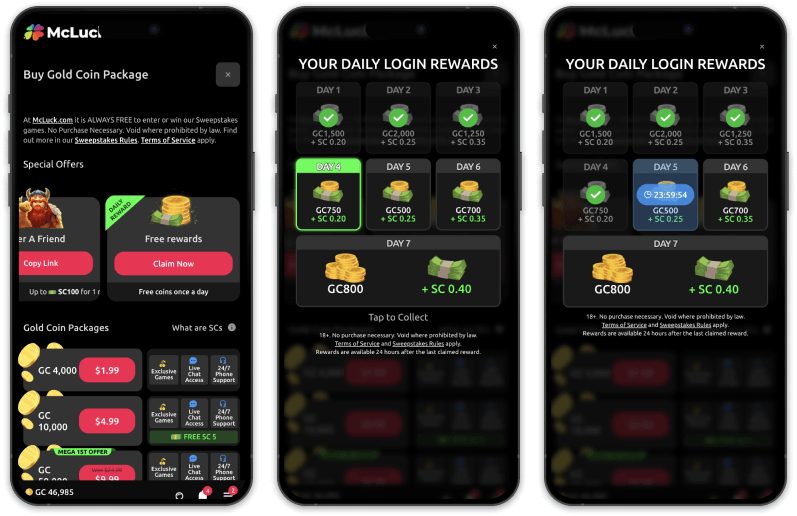
 Colin MacKenzie, Senior Casino Editor
Colin MacKenzie, Senior Casino Editor
List of sweepstakes casino mail-in offers
We can't stress this enough to new sweeps players — you never need to purchase coins to play at sweepstakes casinos. To comply with Federal Trade Commission (FTC) regulations, sweepstakes casino operators must offer an Alternate Method of Entry (AMOE). Generally, this comes in the form of a mail-in bonus.
These offers are ongoing and unlimited, but require you to send a handwritten request on a postcard or a piece of paper. The conditions for mail-in offers can vary across different sweeps casinos, so it’s essential to follow the instructions carefully. If there is any slight error, your mail-in offer can be voided.
Here is a list of some of our favorite sweeps mail-in offers:
| 🎰 Sweeps coins casinos | 💰 Free coins |
|---|---|
| 👑 Crown Coins | 1 Free Sweepstakes Coin |
| 🎁 RealPrize | 1 Free Sweeps Coin |
| 🔵 Stake.us | 5 Stake Cash |
| 🖱️ Casino Click | 3 Free Sweeps Coins |
| 🤠 LoneStar Casino | 1 Free Sweeps Coin |
| 🍔 McLuck | 4 Free Sweepstakes Coins |
| 💲Jackpota | 4 Free Sweeps Coins |
| 💥 Hello Millions | 4 Free Sweeps Coins |
| 🛝 PlayFame | 4 Free Sweeps Coins |
| 🐠 Funrize | 100 Promotional Entries |
| 💎 Spree | 4 Free Spree Coins |
| 8️⃣8️⃣ Jumbo88 | 1 Free Sweeps Coin |
| 📣 Mega Bonanza | 4 Free Sweeps Coins |
| 🗝️ Gold Treasure Casino | 1 Free Sweeps Coin |
| 🧞♂️ Pulsz | 5 Free Sweeps Coins |
| 🌐 BCGAME.us | 1,000 Gold Coins |
| ﹖Chanced | 5 Free Sweeps Coins |
| 🛎️ Ding Ding Ding | 5 Free Sweeps Coins |
| 🌚 Legendz | 5 Free Sweeps Coins |
| 🪙 Moonspin | 1 Free Sweeps Coin |
| 🟡 NoLimitCoins | 100 Free Super Coins |
| 🏈 Punt.com | 5 Free Sweeps Coins |
| 🏍 SpeedSweeps | 2 Free Sweeps Coins |
| 🌪️ Spinfinite | 3 Free Sweeps Coins |
Comparing the best sweepstakes casino bonus offers
 |
 |
 |
 |
|
|---|---|---|---|---|
| 🎰 Casino | Crown Coins | RealPrize | Stake.us | LoneStar |
| 💰 Welcome bonus | 100,000 CC + 2 FREE SC | 2.1 Million GC + 82 FREE SC + 1,000 VIP Points | Up to 550,000 GC, $55 Stake Cash + 3.5% Rakeback | 225,000 GC + 52.5 FREE SC + 250 VIP Points |
| 📟 Promo code | No code required | No code required | COVERSBONUS | No code required |
| 🤑 Sign-up bonus | 100,000 GC + 2 FREE SC | 100,000 GC + 2 FREE SC | 250,000 Gold Coins + $25 in Stake Cash | 100,000 GC + 2.5 FREE SC |
| 💸 First-purchase bonus | Get 200% More Coins on First Purchase - 1.2M CC + 60 SC + Spin to Win up to 200 SC | 2 Million GC + 80 FREE SC + 1,000 VIP points for $25 | N/A | 125,000 GC + 50 FREE SC + 250 VIP Points for $24.99 |
| 🔐 Daily login bonus | 5,000 CC on day 1 up to 100,000 CC + 2 SC on day 7 | 5,000 GC + 0.30 SC | 10K Gold Coins + $1 Stake Cash | 5,000 GC + 0.30 SC |
| 📫 Mail-in offer | 1 SC | 1 SC | $5 in Stake Cash | 1 SC |
| 🤝 Refer-a-friend | Up to 400,000 Crown Coins + 20 Sweeps Cash | 200,000 GC and 70 SC if they purchase $15 in coins | 10% commission rate based on the house edge and gameplay | Earn up to 200,000 GC + 70 SC |
Sites like and best sweepstakes casino alternatives
| 🎰 Sweepstakes casino | 🧐 Alternatives | 🎯 Best features |
|---|---|---|
 |
Sites like Chumba Casino | One of the most popular and original sweepstakes casinos |
 |
Sites like Crown Coins | Great sweepstakes casino with incredible app |
 |
Sites like Funzpoints | Over 100 titles from in-house software provider |
 |
Sites like Hello Millions | Engaging user-friendly design and with hundreds of games from 35 providers |
 |
Sites like Luckyland | A popular sweeps site that recently changed to Luckyland Casino |
 |
Sites like McLuck | Great collection of games with iOS and Google Play Store apps available. |
 |
Sites like Stake.us | Great crypto sweepstakes casino with incredible selection of original titles |
 |
Sites like Zula | Hugely popular sweepstakes casino with one of the most lucrative sign-up bonuses |
What are Gold Coins and Sweeps Coins?
There are two types of virtual currencies to be aware of when preparing to play at online sweepstakes casinos — Gold Coins (GC) and Sweeps Coins (SC).
Gold Coins don’t hold any monetary value but are required at online sweepstakes casinos. If you’re looking for sweepstakes games to play for free, then GC is what you’ll be using to do so, and you can always purchase more of them if you run out.
Sweeps Coins are the coins you use to play games if you're looking to redeem prizes. These coins cannot be purchased. You can acquire free SC by claiming a welcome bonus or participating in contests that online sweepstakes casinos regularly run on their social media platforms. Sweeps Coins are often included as a bonus when you purchase GC, but you're not specifically purchasing the SC.
We've included this table to summarize the key differences between Gold Coins and Sweeps Coins:
| 🟡 Gold Coins | 🪙 Sweeps Coins |
|---|---|
| ✅ Cannot be redeemed for prizes | ✅ Can be redeemed for real prizes |
| ✅ Can be used with all sweeps games | ✅ Used on premium sweeps only |
| ✅ No cash value | ✅ No monetary value but can be redeemed for prizes |
| ✅ No wagering requirements | ✅ Included with some Gold Coin packages |
| ✅ Can be purchased | ✅ Requires a minimum 1x play-through |
 Colin MacKenzie, Senior Casino Editor
Colin MacKenzie, Senior Casino Editor
How to purchase Gold Coin packages
Sweepstakes casinos always reward new players with a free sign-up bonus when they create an account, offering free Gold Coins immediately upon registration. This gives players a coin balance to get started with, but there is the option to purchase additional coin bundles.
Purchasing coin bundles at a sweeps casino is simple. Just follow these steps to get started:
-
Visit the coin purchase page
Log in to your chosen online sweepstakes casino and visit the coin purchase page.
-
Review the available coin bundles
Compare the different coin packages, considering your budget and current coin balance. Once you have selected your chosen coin package, click 'buy' or 'purchase.'
-
Choose a payment method
Opt for the payment method that best suits your needs, and complete the required information. Confirm your purchase by completing any required verification steps.
-
Enjoy your coins
Check your account balance to ensure your new coins are available and start playing.
Most online sweepstakes casinos offer a wide variety of coin packages to cater to players of all budgets. Here's an example of what typical coin bundles look like.
| Price | Gold Coins | Sweeps Coins |
|---|---|---|
| $1.99 | 🎁 4,000 GC | N/A |
| $4.99 | 🎁 10,000 GC | 🪙 5 Free SC |
| $9.99 💰First-purchase bonus 💰 | 🎁 50,000 GC | 🪙 25 Free SC |
| $19.99 | 🎁 40,000 GC | 🪙 20 Free SC |
| $49.99 | 🎁 100,000 GC | 🪙 51 Free SC |
| $74.99 | 🎁 200,000 GC | 🪙 100 Free SC |
| $99.99 | 🎁 200,000 GC | 🪙 102 Free SC |
 Colin MacKenzie, Senior Casino Editor
Colin MacKenzie, Senior Casino Editor
Popular purchase methods at sweepstakes casinos
U.S. sweepstakes casinos support several popular purchase methods in 2026. From Visa and Mastercard to Apple Pay and Skrill, there are plenty of options when purchasing Gold Coins at your favorite sweepstakes website.
| Purchase method | Processing time | Fees |
|---|---|---|
| 🏛️ Online banking | Instant | No |
| 💳 Visa | Instant | No |
| 🎫 Mastercard | Instant | No |
| Instant | No | |
| Instant | No | |
| 🅿️ PayPal | Instant | No |
| 🛅 Trustly | Instant | No |
| 💰 Skrill | Instant | No |
| ₿ Cryptocurrency | Instant | No |
Do sweepstakes casinos pay real money?
Yes, sweepstakes casinos offer players the chance to win and redeem real money prizes among other rewards. At an online sweepstakes casino, players use virtual currency for gameplay (usually GC and SC), which is given out for free when you sign up.
If you choose to, you can purchase additional GC bundles. The coin package usually includes SC, which is given to you as a free bonus. This is similar to the McDonald's Monopoly promotion, where you buy food and are given the peel-off tokens as part of a promotion that can be claimed for prizes.
These SC can later be exchanged for real money prizes and gift cards.
 Colin MacKenzie, Senior Casino Editor
Colin MacKenzie, Senior Casino Editor
Are sweepstakes casino winnings taxable?
Yes, while states don't recognize the difference between sweepstakes casinos and traditional real money online casinos, the federal government doesn't treat them differently. In the eyes of the IRS, any winnings are seen as taxable income, and you have to pay taxes on them.
Can you write off sweepstakes casino losses?
Gambling winnings are taxable income, while losses are itemized deductions. If you do not have enough itemized deductions to exceed your standard deduction, your losses will not affect your taxable income.
To report your Sweeps Coin casino winnings to the IRS, you must fill out a Form 1040.
✅ If you win a prize of more than $600, the online sweeps site will produce a 1099-MISC for you to fill out.
✅ If you win a prize of $5,000 or more, the sweepstakes casino will withhold 24% of your prize and issue a W-2G tax form documenting how much has been withheld.
 Colin MacKenzie, Senior Casino Editor
Colin MacKenzie, Senior Casino Editor
How do prize redemptions work at sweepstakes casinos?
To claim your sweepstake casino prizes, you’ll need to verify your identity. We recommend doing this when you create your account, just to get it out of the way, as it can take a couple of days in some cases.
Accepted KYC (Know Your Customer) account verification documents at sweeps casinos include:
✅ Proof of identity: A primary form of verification is a government-issued photo ID, most likely a passport, driver’s license, or state ID card.
✅ Proof of address: Another way casinos verify your identity is by verifying your current address, so a copy of a bank statement, utility bill, or an accepted alternative is required.
Once you have verified your account, you will still need to fulfill the SC playthrough requirements for the sweeps casino and have the minimum amount of SC to redeem a prize.
✅ Playthrough requirement: The minimum number of times Sweeps Coins must be played before they can be used for prize redemptions. Most sweepstakes casinos have a 1x playthrough requirement, but there are some spots like Stake.us that have a 3x requirement.
✅ Minimum redemption limits: Generally, the minimum required SC for gift card prize redemption is the lowest number. We've included a list below of minimum redemption methods at some top sweepstakes casinos.
How to claim sweepstakes casino prizes?
While you can't cash out your Sweeps Coins for real money like a traditional site, you redeem Sweeps Coins for cash prizes or gift cards. Follow these steps to redeem your coins for prizes:
-
Verify your account
Make sure you’ve completed the KYC verification steps, as prize redemptions are only possible once an account has been verified.
-
Meet the wagering requirements
Wagering requirements for sweeps coins are generally a 1x before they can be redeemed. However, we have been seeing more and more new sweepstakes casinos introduce 3-5x wagering requirements, particularly with bonus coins from daily login bonuses, social giveaways, or bonus drop codes.
-
Check your SC balance
Ensure you have a sufficient SC balance on your account. Each online sweeps casino will require a different amount for prize redemption.
Go to 'Redeem' to confirm your coin balance.
-
Select your prize
Select in which form you would like to redeem your prize.
If you choose a gift card, you will see a list of available stores to choose from. Once you select and confirm, you will receive the gift card via email.
If you opt for cash redemption, you need to enter the amount and choose your preferred banking option. Once you confirm, you will get a confirmation email and receive your cash within a few business days.
 Colin MacKenzie, Senior Casino Editor
Colin MacKenzie, Senior Casino Editor
What is the best payout sweepstakes casino?
As we've discussed, you don't withdraw money from your sweepstakes casino account. At online sweeps, you play with virtual currency which you then redeem for gift cards or other prizes. Sweepstakes casinos often partner with a gift card platform, so you will be able to redeem your winnings to use at well-known retailers.
These are some of the best payout sweepstakes casinos and the minimum SC redemption amounts for prizes and gift cards:
| 🎰 Sweepstakes casino | 💴 Cash prizes | 🛒 Gift cards |
|---|---|---|
| 👑 Crown Coins | 50 SC | 50 SC |
| 🎁 RealPrize | 100 SC | 45 SC |
| 🔵 Stake.us | 5 SC ⚠️ Crypto-only⚠️ | N/A |
| 🖱️ Casino Click | 100 SC | N/A |
| 🍔 McLuck | 75 SC | 10 SC |
| 💲 Jackpota | 75 SC | 10 SC |
| 💥 Hello Millions | 75 SC | 10 SC |
| 🛝 PlayFame | 75 SC | 10 SC |
| 🐠 Funrize | 10,000 PE | 2,500 PE |
| 💎 Spree | 100 SC | 10 SC |
| 📣 Mega Bonanza | 75 SC | 10 SC |
| 🗝️ Gold Treasure | 50 SC | N/A |
| 🏈 Punt.com | 100 SC | 10 SC |
| 🏍️ SpeedSweeps | 100 SC | N/A |
"Most, but not all, sweepstake casinos have a minimum redemption requirement of 100 Sweeps Coins. This means you must amass a minimum balance of 100 Sweeps Coins before you can redeem them for real money."
 Colin MacKenzie, Senior Casino Editor
Colin MacKenzie, Senior Casino Editor
What sweepstakes casino has the best RTP?
During our testing of sweepstakes casinos we found Crown Coins has the highest RTP that has a reported RTP of 98.4%. In a nutshell, payout rates indicate how much a player can expect to win based on their wagers over an extended period of time. This is commonly referred to as RTP.
It only makes sense for players to target sweepstakes casinos with the highest payout rates. Focusing on these is an easy way to increase their chances of winning prizes and getting the most out of free coin bonuses.
You can see some of our top picks in more detail on our best payout online casinos page.
| 🎰 Sweepstakes Casino | 📈 RTP |
|---|---|
| 👑 Crown Coins | 98.4% |
| 🤠 LoneStar | 98.26% |
| 🎁 RealPrize | 96.7% |
| 🔵 Stake.us | 96.5% |
| 🍔 McLuck | 98.12% |
| 📣 Mega Bonanza | 96% |
| 🏴☠️ Big Pirate | 96% |
| 💥 Hello Millions | 98.08% |
| 💲 Jackpota | 98.05% |
| 🐠 Funrize | 98.01% |
| 🌚 Legendz | 97.9% |
| 💎 Spree | 97.75% |
| 🏍 SpeedSweeps | 97.5% |
| 🟡 NoLimitCoins | 96.76% |
What sweepstakes casinos have instant payout?
One of the first questions players ask when looking for a sweeps casino is "which sweepstakes casino pays out the fastest?" No one wants to wait around for prizes so we put together this list of the fastest paying casino sites.
| 🎰 Sweepstakes casino | 🏎️💨 Fastest redemption method | ⏱️ Fastest payout time |
|---|---|---|
| 👑 Crown Coins | Skrill | Within 48 hours |
| 🎁 RealPrize | Gift Cards | Instantly |
| 🔵 Stake.us | Tron | Within 24 hours |
| 🖱️ Casino Click | Bitcoin | Within 24 hours |
| 🍔 McLuck | Gift Cards | Within 48 hours |
| 💲 Jackpota | Gift Cards | Within 48 hours |
| 💥 Hello Millions | Gift Cards | Within 72 hours |
| 🛝 PlayFame | Gift Cards | Within 24 hours |
| 🐠 Funrize | Gift Cards | Within 24 hours |
| 💎 Spree | Gift Cards | Within 24 hours |
| 📣 Mega Bonanza | Gift Cards | Within 24 hours |
 Colin MacKenzie, Senior Casino Editor
Colin MacKenzie, Senior Casino Editor
What is the best sweepstakes casino app?
The best sweepstakes casinos all use cutting-edge technology to provide a fully responsive experience when gaming on smartphones and tablets. However, there can be benefits to using a native sweepstakes casino app on iOS and Android devices.
Sweeps apps are easily accessible on both the Apple App Store and the Google Play Store. The process of downloading a sweepstakes casino app is seamless, and once a sweeps app is installed on your mobile device, you'll have full access to the game library and improved gameplay.
 |
 |
 |
 |
|
|---|---|---|---|---|
| 🎰 Casino | Crown Coins | McLuck | Pulsz | Hello Millions |
| 4.8/5 ⭐ (67K reviews) | 4.5/5 ⭐ (9.2K reviews) | 4.4/5 ⭐ (14K reviews) | N/A | |
| N/A | 3.9/5 ⭐ (11.4K reviews) | 4.1/5 ⭐ (25.3K reviews) | 4.0/5 ⭐ (3.6K reviews) | |
| 🧐 Games | 550+ | 1,000+ | 1070+ | 560+ |
| 🏅 Top feature | Early bird exclusive releases | McJackpot | Best sweepstakes casino app | Unique and engaging comic-book theme |
| 📏 Size | 211.1 MB | 115.5 MB | 123.1 MB | N/A |
| 💰 Sign-up bonus | Get 200% More Coins on First Purchase - 1.2M CC + 60 SC + Spin to Win up to 200 SC | 57,500 GC + 30 FREE SC | 1,005,000 GC + 77.3 Free SC + 750 Pulsz points + a Golden Key | 92,500 GC + 52.5 Free SC |
How to download a sweepstake casino app
Many online sweepstakes casino apps are available in the U.S., and new ones are released regularly. Downloading and using apps are second nature to anyone with a smartphone these days, but we've explained the basics below.
Here’s a step-by-step guide to downloading a sweepstakes casino app:
-
Choose a sweepstakes casino app
Check out our list of top sweepstakes apps and find the sweeps app that suits you.
-
Download the app
You can find your chosen app in the App Store or Google Play Store, or download it directly from the site as an APK file.
-
Create an account
Sign up by entering your details and verifying your information. You’ll also get free coins when you verify your account.
-
Log in
Use your account details to sign in to the app and start playing.
 Colin MacKenzie, Senior Casino Editor
Colin MacKenzie, Senior Casino Editor
More casino resources
Latest industry news
 Why trust Covers?
Why trust Covers?
Covers has been around for over 30 years, and as a team, we have a cumulative total of hundreds of years of experience in the online betting industry. We thoroughly and expertly evaluate every casino and sweepstakes casino site, only recommending the best and most trustworthy places to play.
The following online publications turn to us for industry-best analysis and to leverage our expertise in the sports betting and iGaming space in 2026.





Affiliate Disclosure: Covers boasts more than 30 years of sports betting experience, and our casino experts have worked in the iGaming industry for decades. Our long-standing relationship with regulated, licensed, and legal gaming sites allows our active community of 20 million users to access expert analysis and recommendations. Covers may receive an advertising commission if you visit a sportsbook or casino betting site via select affiliate links across our site, create an account, and make a deposit. However, no amount of money ensures that an operator will get listed.
Responsible social gaming at online sweepstakes casinos
We take responsible gaming seriously at Covers, and many of the same safety principles apply when playing at both real money online casino sites and sweepstakes casinos. It is advisable to have regular breaks during gaming sessions, and only play as part of a balanced lifestyle. You should never play when under the influence of drugs or alcohol, and it is important to stick to a budget.
If you have an addictive personality, it's worth paying attention to certain marks to help keep yourself in check. If you notice any of these red flags, it might be worth stepping back or reaching out for help.
🚩 Not sticking to a budget and overspending
🚩 Chasing losses
🚩 Playing too much time and skipping out on other commitments/responsibilities
🚩 Negatively affecting relationships with friends and family
Sweepstake Casino responsible social gaming tools
We also suggest taking advantage of your sweeps casino’s responsible gaming tools. We only recommend operators that offer responsible gaming tools. These can include:
✅ Account history
✅ Account timeout
✅ Activity reminder
✅ Budget Limits
✅ Playtime limits, including daily time limits
✅ Cool-off periods
✅ Self-exclusion
Counseling and helplines are available to anyone impacted by problem gambling across the U.S., with nationwide and state-specific resources accessible 24 hours a day.
The National Council on Problem Gambling (NCPG) provides information and support in your state. Gamblers Anonymous offers a safe space for people to share their experiences, while Gam-Anon is a self-help organization assisting to those directly impacted by a compulsive gambler.
 Gambling helplines
Gambling helplines
| Organisation | Phone number |
|---|---|
| Gam-Anon | 718-352-1671 |
| Gamblers Anonymous | 855-2CALLGA |
| National Problem Gambling Helpline | 1-800-GAMBLER |
Many sweeps casino sites also allow players to set account restrictions or limits on themselves. Often, players can set purchase limits or join the self-exclusion list.
Sweepstakes casinos FAQ
Sweepstakes casinos are online sites that allow players to wager virtual currency on casino games in an attempt to win real cash prizes.
The top U.S. sweepstakes casino sites are: Real Prize, WOW Vegas, Crown Coins, Stake.us, McLuck, High 5, Jackpota, Hello Millions, Mega Bonanza, and Pulsz.
Yes, sweepstakes casinos are legal and registered to operate in the U.S. Use this guide to find the best sweepstakes casinos to play now.
In most states, you must be 18 or older to play at an online sweepstakes casino.
While dual-currency is used to power gameplay at sweepstakes casinos, you can redeem Sweeps Coins for a variety of prizes, including real money and gift cards.
Yes. Most sweepstakes casinos offer a no-deposit bonus and ongoing promotions for players to enjoy.
Players can enjoy many games at sweepstakes casinos, including slots, table games, and video poker options.
No. Sweepstakes casinos are not considered gambling as players play for virtual currencies instead of real money.
Pages related to this topic
Colin MacKenzie is a seasoned casino content editor at Covers, with more than a decade of experience writing in the online gambling space. He brings firsthand knowledge and a player-first perspective to every piece, from honest reviews of North America's top iGaming operators to bonus code guides. Colin is channeling his focus on the sweepstakes and social casino space, where he tests platforms, verifies promotions, and breaks down the fine print so players know exactly what to expect. The Maritimes-based editor's insights help readers navigate offers confidently and responsibly. When he's not deciphering bonus terms and playthrough requirements, Colin’s either soaking up the sea breeze or turning fairways into sand traps.







































